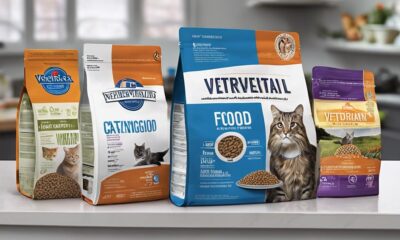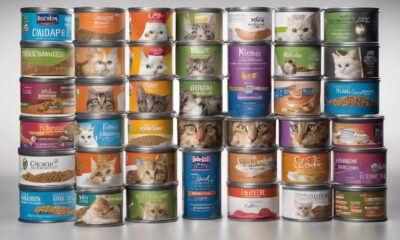Cats
Can Cats Have Shrimp?
Open a world of possibilities for your feline friend with shrimp as a treat, but first, discover how to serve it safely and in moderation.
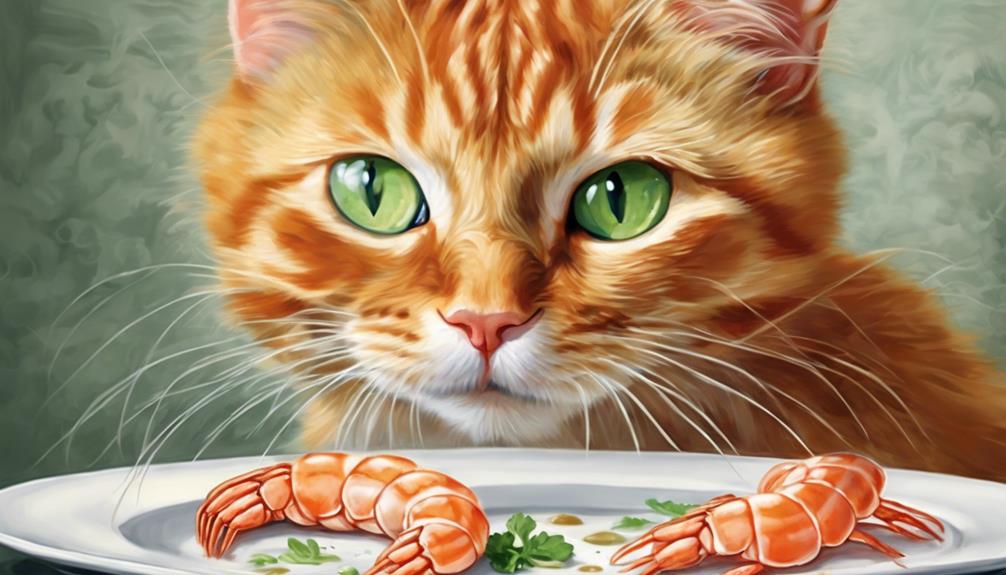
Yes, cats can enjoy shrimp as a treat. Shrimp provides cats with protein, vitamins, and minerals while being low in calories and easy to digest. It supports their skin, heart, and brain health, adding variety to their diet. Remember to cook the shrimp thoroughly, remove the shell and devein before serving, and avoid seasonings. Crucial is key; limit shrimp to once or twice a week, watching for excess salt intake. Cooking safely is essential to prevent allergies. Consider these tips for a balanced diet. More helpful insights await about serving shrimp to your feline friend.
Key Takeaways
- Shrimp is safe for cats in moderation.
- Cook thoroughly to avoid harmful bacteria.
- Remove shell, tail, and devein before serving.
- Consult vet for appropriate portion size.
- Monitor for allergies and adverse reactions.
Shrimp as a Cat Treat
Shrimp makes a tasty and protein-rich treat for cats. When it comes to treating our feline friends, it's important to make sure that the shrimp provided is safe for consumption. Opt for cooked shrimp that's deveined and free of shells to prevent any choking hazards.
It's vital to remember that treats like shrimp should only make up a small portion, about 10%, of a cat's daily diet to maintain a balanced nutrition plan. By offering cooked shrimp as an occasional snack, we can provide our cats with a flavorful and nutritious addition to their meals.
To keep our cats healthy and happy, it's best to limit shrimp treats to once or twice a week. Monitoring our cats for any adverse reactions or digestive issues after indulging in shrimp treats is also important. By following these simple guidelines, we can make sure that our cats enjoy their shrimp treats safely and responsibly.
Nutritional Benefits of Shrimp for Cats
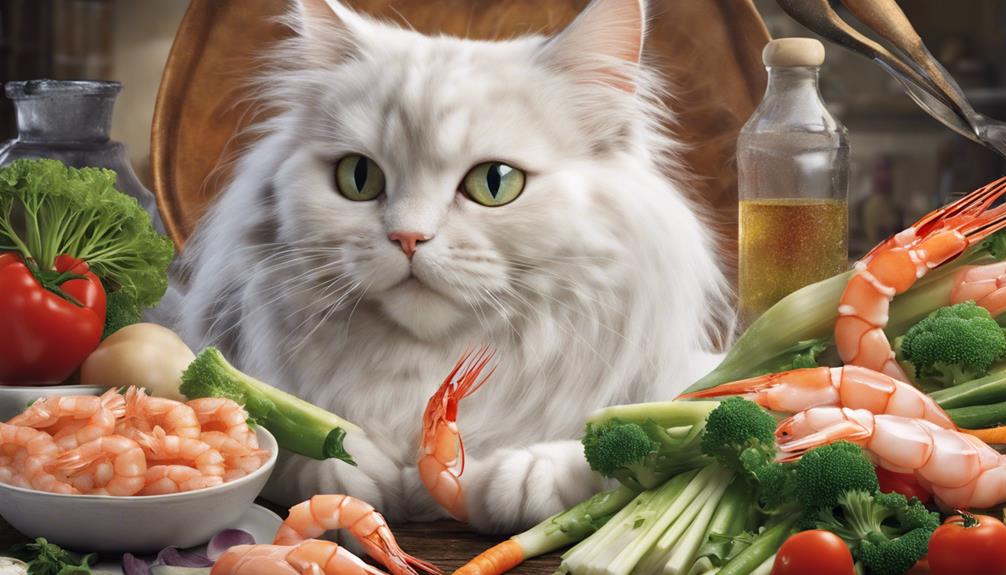
High in protein, essential vitamins, minerals, and antioxidants, shrimp offers a variety of nutritional benefits for our feline companions. Cats eat raw shrimp, absorbing key nutrients like B12, omega-3, omega-6, and choline that support their skin, heart, and brain health. These health benefits contribute to the overall well-being of our beloved cats.
Additionally, fresh seafood such as shrimp adds diversity to a cat's diet, ensuring they receive a range of essential nutrients for best health. While shrimp treats should be given in moderation due to their low-fat content, they can be a flavorful and nutritious addition to your cat's diet. Including shrimp in your cat's meals occasionally can provide them with a tasty treat while also supporting their health.
Cooking Shrimp for Cats
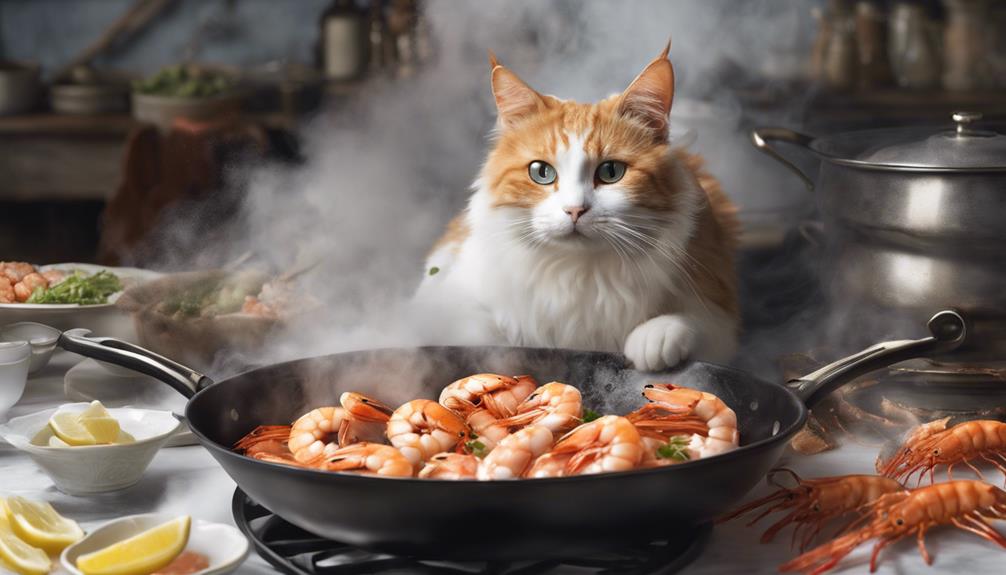
When preparing shrimp for your feline friend, it's important to guarantee thorough cooking to eliminate harmful bacteria. Ensuring that the shrimp is safe for your cat involves properly cooking it. To do this, remove the shell, tail, and devein the shrimp before cooking. This not only makes it easier for your cat to eat but also prevents any choking hazards.
Opt for plain cooked shrimp without seasonings, oils, or butter to keep it safe for your furry companion. The cooking process is vital in making sure the shrimp isn't only delicious but also safe for your cat to enjoy. Consulting your veterinarian to determine the appropriate quantity of shrimp for your cat is always a wise choice.
Serving Shrimp in Moderation
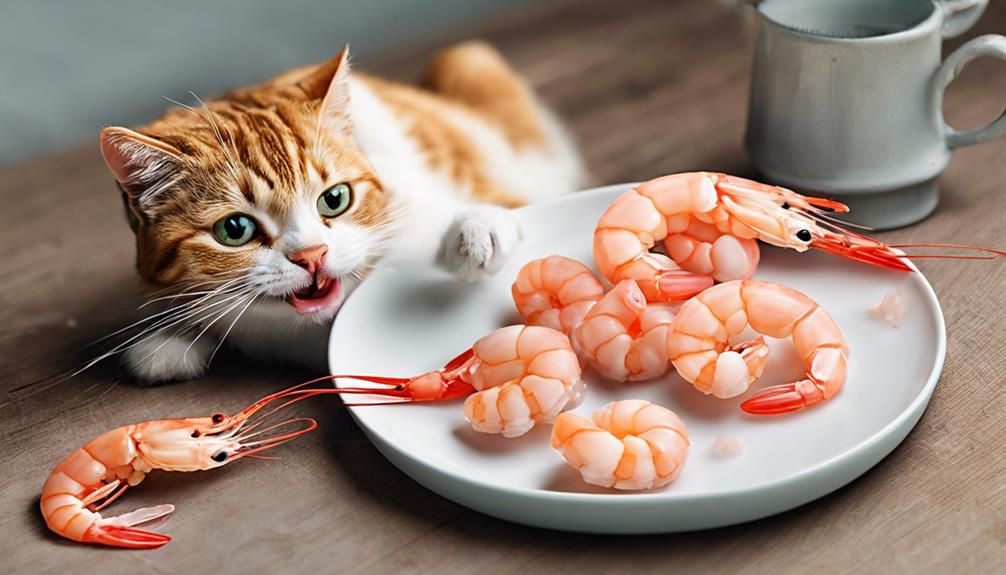
While shrimp can be a tasty treat for cats, it's important to serve them in moderation to maintain their overall health. Feeding shrimp to your furry friend occasionally can be a delightful experience for both of you. However, due to the high salt content in shrimp, it's essential to be cautious.
Too much salt in their diet can be harmful to cats, especially those with underlying health conditions like heart, kidney, or urinary diseases. These conditions can be exacerbated by foods high in salt, such as shrimp. Overindulging your cat with shrimp can lead to dehydration and even high blood pressure over time.
Hence, it's best to limit the amount of shrimp you offer your cat and make sure it's not a daily occurrence. By feeding shrimp in moderation and being mindful of their salt intake, you can continue to enjoy sharing this occasional treat with your feline companion while keeping them healthy and happy.
Fresh Vs. Farmed Shrimp for Cats
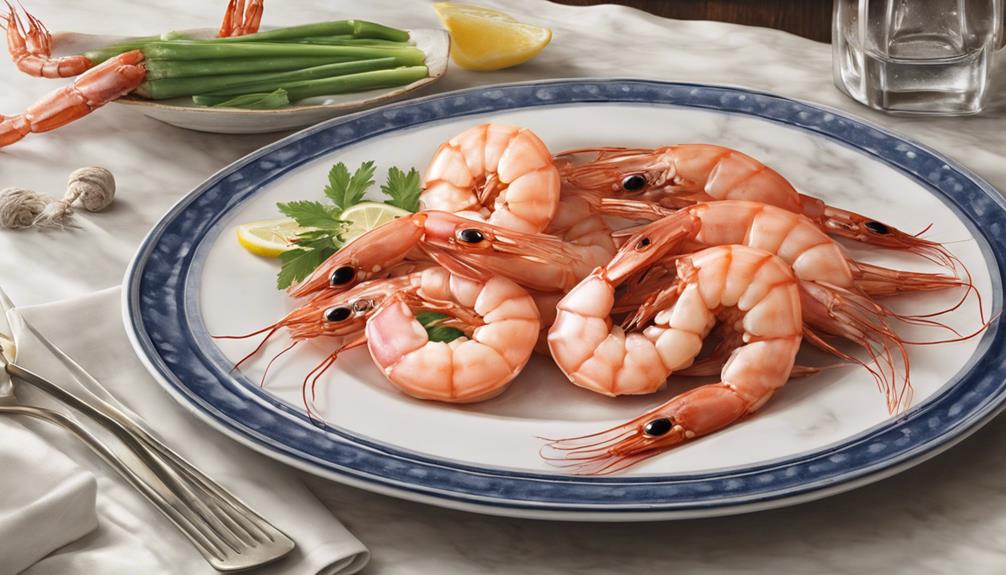
When contemplating fresh versus farmed shrimp for your cat, it's essential to prioritize their health and well-being.
Fresh shrimp may offer fewer contaminants and chemicals, while farmed shrimp could contain higher levels of harmful substances.
To guarantee your cat's safety, selecting certified farmed shrimp with quality certifications like ASC, GAA, or BAP might be the best option.
Shrimp Quality Matters
Choosing between fresh and farmed shrimp for cats can greatly impact the quality of their diet. When considering shrimp quality for your feline friend, here are some key points to keep in mind:
- Fresh Shrimp: Opting for fresh shrimp may provide higher quality and freshness for your cat's diet.
- Farmed Shrimp Certification: Look for certifications like ASC, GAA, or BAP when selecting farmed shrimp to guarantee safety for your cat.
- Source of Shrimp: Whether wild-caught or farmed, the source of the shrimp can influence the quality for your cat's consumption.
- Shrimp Intake Limit: Be mindful of the shrimp intake limit to prevent potential mercury exposure, especially with wild-caught varieties.
Consider these factors to make informed decisions when choosing shrimp for your cat's meals.
Health Benefits Consideration
Taking into account the health benefits for cats, the choice between fresh and farmed shrimp becomes vital in guaranteeing a safe and nutritious diet. Fresh shrimp, caught in the wild, may offer better nutrition for your feline friend as they tend to have fewer additives and preservatives.
On the other hand, farmed shrimp could pose safety concerns due to potential exposure to antibiotics and harmful chemicals. When selecting shrimp for your cat, it's essential to ponder the source to minimize risks. Opting for certified farmed shrimp with quality certifications like ASC, GAA, or BAP could provide a safer choice.
Moderation Is Key
In determining the ideal shrimp option for cats, prioritizing importance plays an essential role in maintaining their well-being and safety. When it comes to choosing between fresh and farmed shrimp for your feline friend, here are some key points to take into account:
- Fresh shrimp is a safer choice due to lower contamination risks.
- Opt for certified farmed shrimp from sources like ASC, GAA, or BAP to guarantee cat safety.
- Both fresh and frozen shrimp can be suitable, but proper preparation is critical.
- Limit the amount of shrimp in your cat's diet to prevent mercury exposure.
Cats Preference for Shrimp
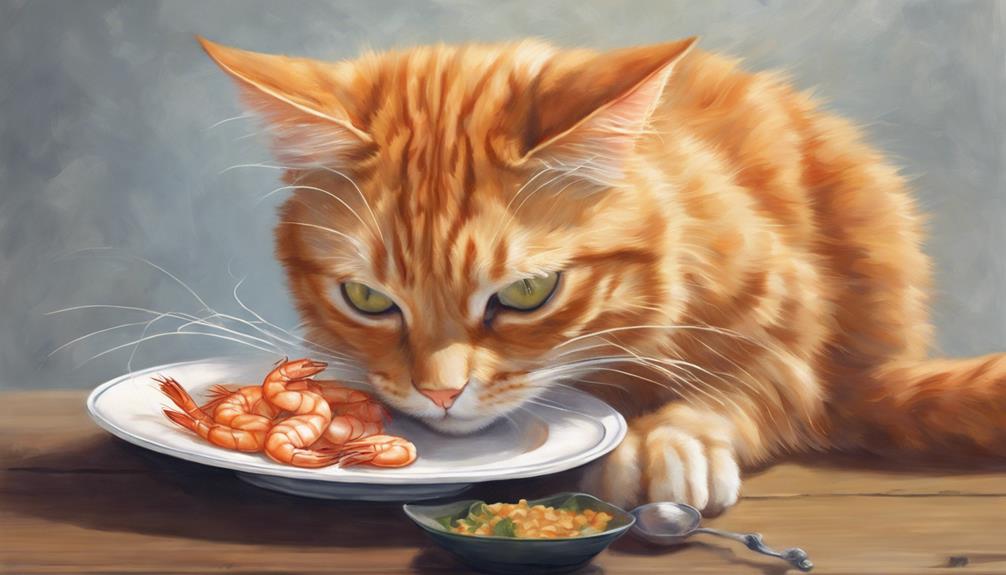
Cats absolutely love shrimp due to its fishy scent and protein-rich content, making it a delightful treat for our feline friends.
The natural taste of fresh, wild-caught shrimp is particularly appealing to cats as carnivores.
When offering shrimp to cats, opt for plain-cooked varieties without any seasonings for the safest and most enjoyable feline experience.
Feline Love for Shrimp
Savoring the fishy scent and hearty texture, felines eagerly partake in shrimp as a favored treat. Cats are naturally drawn to the savory aroma and rich taste of shrimp, satisfying their carnivorous cravings.
Here are some reasons why cats love shrimp:
- Appeal to Instincts: The meaty nature of shrimp resonates with cats' hunting instincts.
- Nutritional Similarity: Shrimp's protein-rich composition mirrors the dietary requirements of cats in the wild.
- Excitement Factor: Cats often show enthusiasm and excitement when presented with plain-cooked shrimp.
- Health Benefits: The nutritional value of shrimp, including essential nutrients and antioxidants, adds to its allure for cats.
With their keen senses and preference for meaty textures, it's no wonder cats are captivated by the delectable taste of shrimp!
Shrimp as Cat Treat
Savoring the irresistible allure of shrimp, felines often display a strong inclination towards this protein-rich treat. Cats simply can't resist the meaty aroma and taste of shrimp, making it a nutritious and safe option for a special snack. To give you a clearer picture, here's a handy table showcasing why shrimp for your cat can be a delightful choice:
| Shrimp for Your Cat | Nutritious Treat | Safe for Cats |
|---|---|---|
| Irresistible aroma | Protein-rich | Gentle on stomach |
| Meaty flavor | Source of vitamins | Easy to digest |
| Enticing texture | Low in calories | High in flavor |
Health Risks of Raw Shrimp
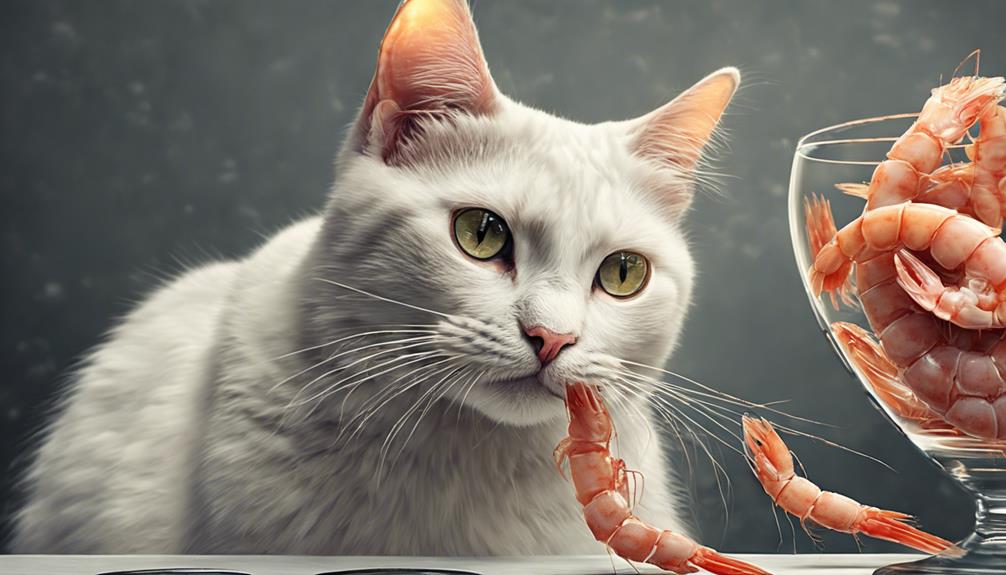
When it comes to raw shrimp, it's essential to think about the following:
- Cooking shrimp thoroughly is vital to eliminate any potential harmful contaminants.
- Feeding raw shrimp to cats can lead to digestive issues or food poisoning.
- Raw shrimp may harbor pathogens like Salmonella, Listeria, or Vibrio that can make cats sick.
- It's important to always cook shrimp before feeding it to cats to guarantee their safety and well-being.
As much as cats may be intrigued by the smell of raw shrimp, it's crucial to prioritize their well-being by steering clear of uncooked seafood.
Avoiding Spices in Shrimp
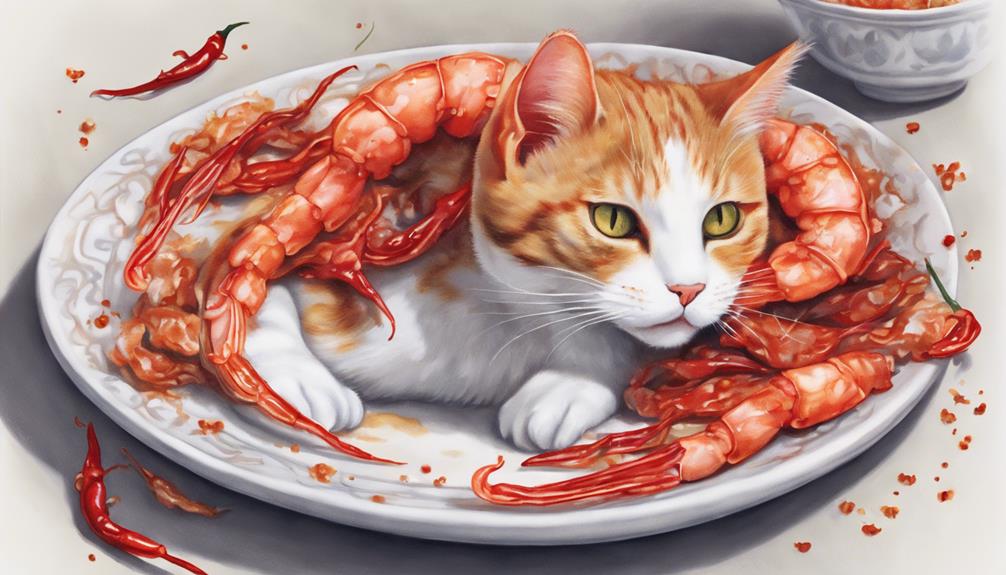
After considering the health risks associated with raw shrimp for cats, it's important to note that avoiding spices in shrimp is crucial to safeguarding your feline friend's well-being. Cats, with their sensitive digestive systems, can be easily affected by spices commonly used in human dishes.
Spices like garlic and onion, frequently added for flavor, are toxic to cats and can lead to stomach upset or more severe health issues. To guarantee your cat's safety, opt for plain-cooked shrimp without any added seasonings or spices.
Plain-cooked shrimp is the safest option for feline consumption, providing a delicious treat without the risk of harmful ingredients. When preparing shrimp for your cat, remember to keep it simple and avoid any seasoning that could potentially harm your furry companion.
Importance of Deveining Shrimp
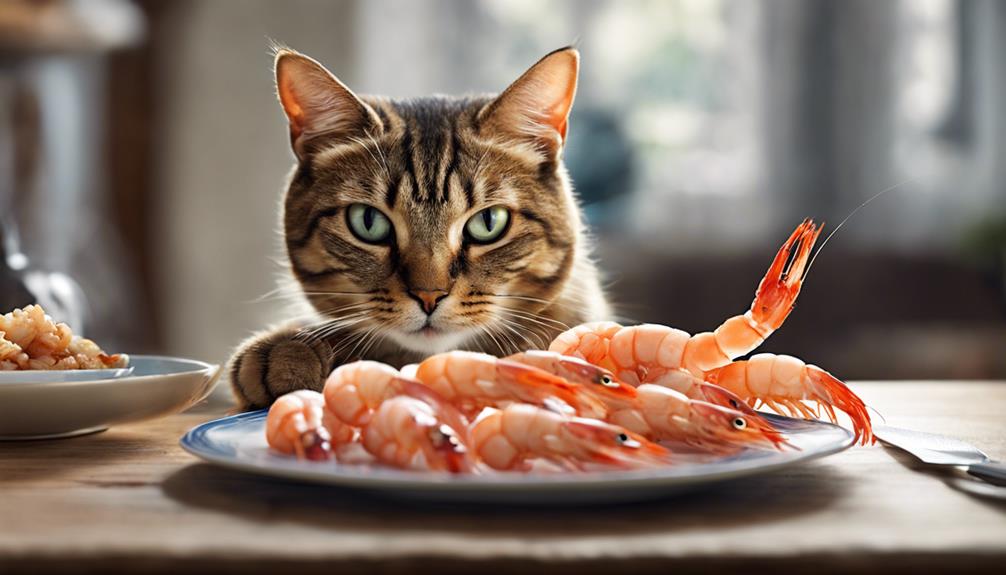
When preparing shrimp, it's essential to understand the importance of deveining. Removing the digestive tract not only guarantees cleanliness but also eliminates potential harmful bacteria.
Additionally, deveining impacts the taste and quality of the shrimp, enhancing both the appearance and flavor of the dish.
Deveining for Health
Ensuring that shrimp are deveined is vital for maintaining the health and quality of shrimp dishes. When we remove the vein, we aren't only enhancing the texture and appearance of the shrimp but also preventing potential health risks associated with consuming it.
Here are some reasons why deveining is essential for the health of both humans and our feline friends:
- Deveining shrimp removes the digestive tract, which may contain sand or grit.
- It enhances the texture and appearance of shrimp dishes.
- Deveining can improve the overall taste and quality of shrimp.
- Removing the vein can prevent potential health risks associated with consuming it.
Flavor Impact of Deveining
Deveining shrimp greatly enhances the flavor profile and overall dining experience for cats. When we remove the dark vein from the shrimp shells, we not only guarantee a cleaner and more appetizing meal for our feline friends but also eliminate any potential contaminants.
Cats can be quite discerning when it comes to their food, and deveining the shrimp helps to make the dish more palatable by removing any gritty or unappetizing elements. Additionally, the texture and appearance of the shrimp are improved, making it a more enjoyable eating experience for our beloved pets.
Cat-Friendly Shrimp Portions
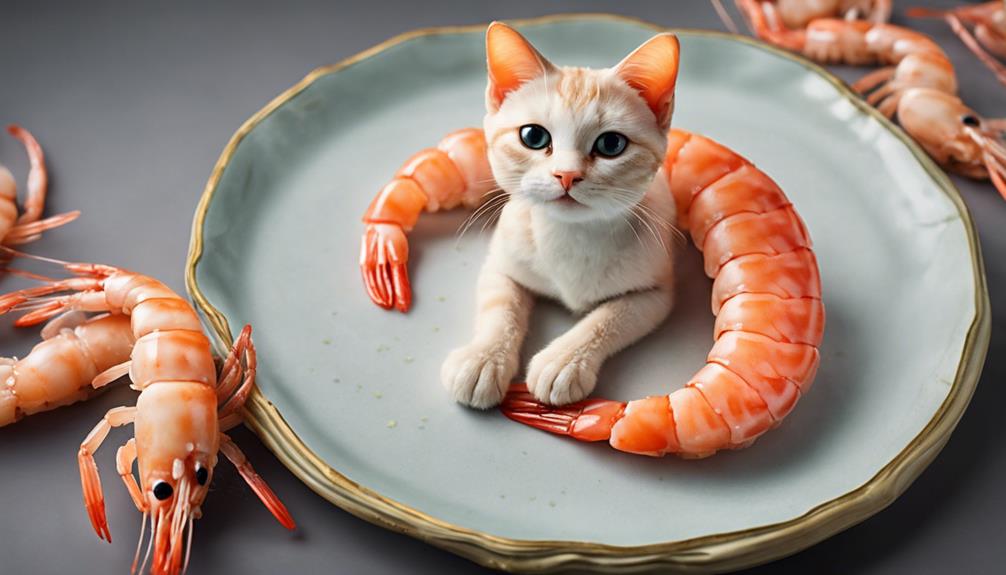
To ensure proper feline health, carefully moderate the portions of shrimp given to cats as a treat. When it comes to sharing this tasty snack with our feline friends, it's crucial to keep their well-being in mind. Here are some tips for cat-friendly shrimp portions:
- Consult a veterinarian for guidance on the appropriate portion size for your cat's specific dietary needs.
- Offer small portions of shrimp as a treat, ideally once or twice a week, to prevent overfeeding.
- Monitor the quantity of shrimp you give to your cat to avoid any potential health issues that may arise.
- Remember that shrimp treats should make up no more than 10% of your cat's daily caloric intake to maintain a balanced diet.
Frequency of Offering Shrimp
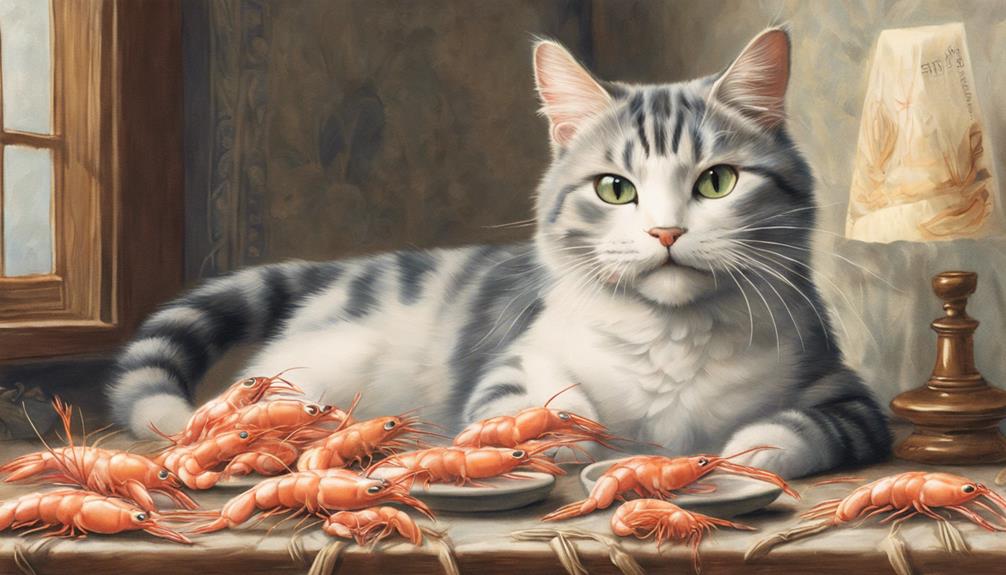
When offering shrimp to cats, it's important to view the frequency as an occasional treat rather than a regular part of their diet. While cats can enjoy the occasional indulgence of shrimp, it's vital to remember that their primary source of nutrition should come from balanced cat food.
Treats, including shrimp, should only make up about 10% of your cat's daily intake to prevent any potential health issues. To maintain a healthy diet for your feline friend, it's recommended to feed your cat shrimp treats once or twice a week. Overfeeding shrimp to cats can lead to weight gain and other health problems over time, so moderation is key.
Shrimp Shells and Cats
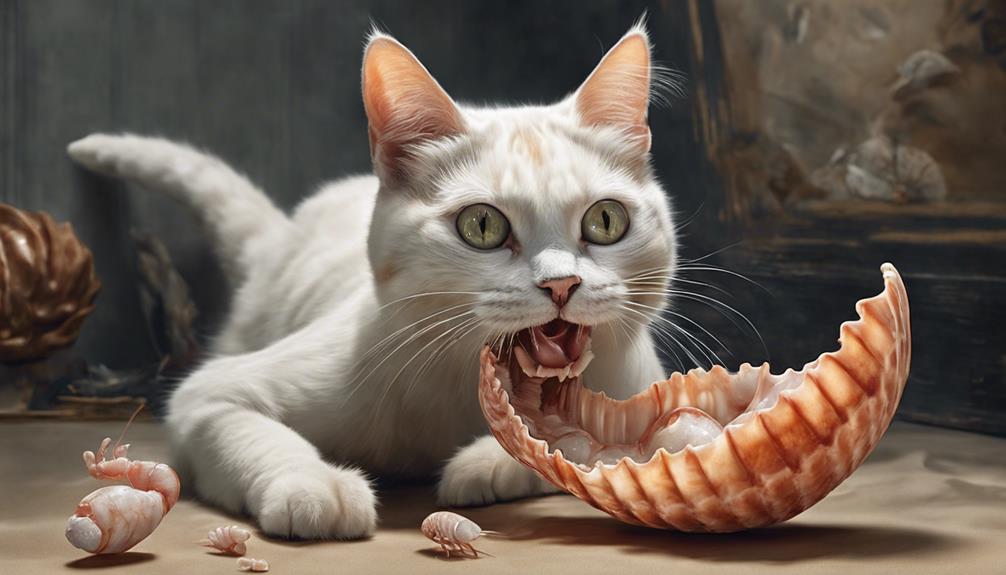
Eliminating shrimp shells before feeding is crucial for guaranteeing the safety and health of cats. Shrimp shells can be high in sodium, posing a choking hazard and being toxic to cats if ingested. Here are some key points to ponder:
- Shrimp shells can be a choking hazard: Cats shouldn't consume shrimp shells due to their indigestible nature.
- Toxicity risk: Ingesting shrimp shells can lead to gastrointestinal blockages in cats, requiring immediate veterinary attention.
- Respiratory distress: Choking on shrimp shells can cause respiratory issues, emphasizing the importance of shell removal.
- Always remove shells completely: Prior to offering shrimp to cats, ensure all shells are removed to prevent any potential harm.
Commercial Cat Food With Shrimp
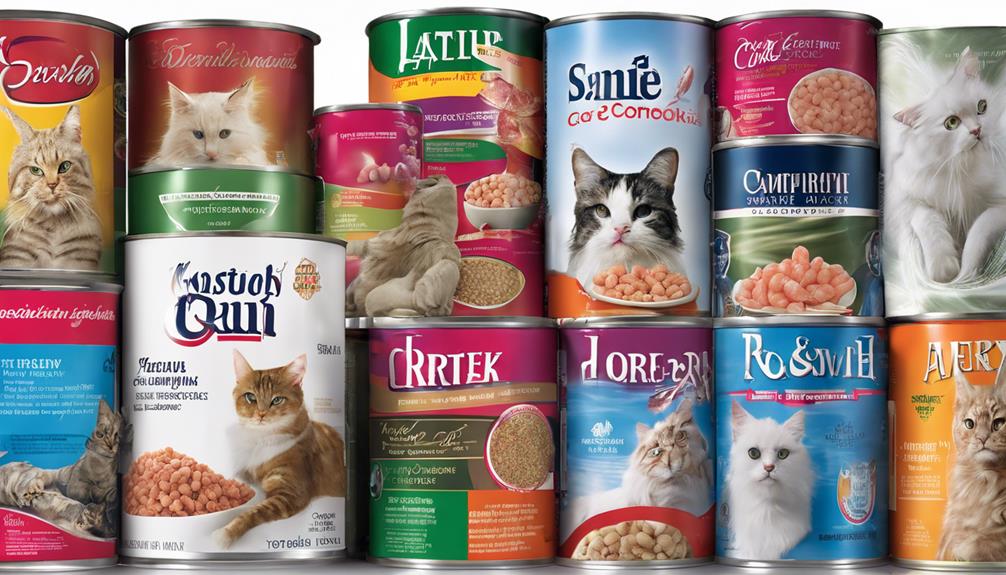
In commercial cat food containing shrimp, essential nutrients are carefully balanced to provide a diverse and nutritious diet for felines. Shrimp is a common protein source in commercial cat food, often combined with other seafood to offer a variety of flavors that add diversity to your cat's meals. It's important to make sure that these commercial cat foods with shrimp contain all the essential nutrients your cat needs to thrive. While cat food should be the main source of nutrition for your feline friend, occasional shrimp treats can be a delightful addition to their diet.
Including shrimp in commercial cat food provides a balanced protein option that can contribute to your cat's overall health and well-being. When choosing cat food with shrimp, make sure to check the ingredient list for essential nutrients like taurine, omega-3 fatty acids, and vitamins that are essential for your cat's growth and development. By incorporating commercial cat food with shrimp into your cat's diet, you can offer them a tasty and nutritious meal that meets their dietary requirements.
Allergic Reactions in Cats
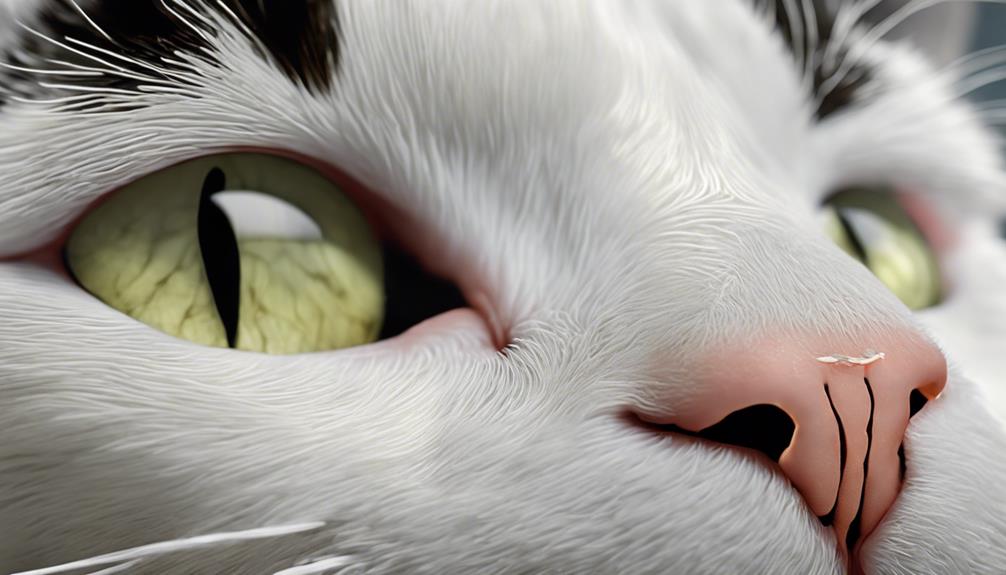
Allergic reactions in cats to shrimp can occur, albeit rarely. If a cat shows signs of diarrhea, vomiting, or itchy skin after consuming shrimp, immediate vet consultation is essential.
Owners should be aware of allergy symptoms, treatment options, and preventive measures to keep their feline friends safe and healthy.
Allergy Symptoms in Cats
When cats have shrimp, they may exhibit various allergy symptoms, such as diarrhea, vomiting, or itchy skin. It's paramount to be vigilant for these signs, especially in cats with seafood allergies.
If your feline companion displays any allergic reactions after consuming shrimp, immediate veterinary consultation is imperative. Adverse reactions to shrimp in cats can vary in severity, underscoring the importance of prompt attention.
To safeguard your cat's well-being, monitoring for allergic symptoms when introducing shrimp to their diet is vital. Remember, their health and comfort are our top priorities.
Let's stay informed and proactive in safeguarding our furry friends' health.
Treatment Options Available
Upon detecting allergic reactions in cats to shrimp, exploring available treatment options becomes mandatory for ensuring their well-being.
If your feline friend shows symptoms like diarrhea, vomiting, or itchy skin after consuming shrimp, immediate veterinary consultation is vital. Veterinarians may recommend treatments such as antihistamines, corticosteroids, or in severe cases, epinephrine injections to alleviate allergic reactions.
Following your vet's guidance closely and avoiding giving shrimp to your cat if they've known seafood allergies are important. Testing can also be conducted to determine specific food allergies, including shrimp.
Prevention Measures for Owners
Wondering how to protect your furry friend from potential allergic reactions to shrimp? Here are some precautionary measures we can take to guarantee our cats stay safe:
- Monitor Closely: Keep an eye on your cat for any adverse reactions after introducing shrimp into their diet.
- Consult a Vet: If you suspect your cat has allergies or shows signs of a reaction, seek advice from a veterinarian.
- Consider Pet Insurance Services: Having pet insurance can help cover unexpected medical costs in case of allergic reactions.
- Avoid Raw Shrimp: Raw shrimp can be harmful to your cat, so make sure to only feed them properly cooked shrimp to minimize risks.
Final Recommendations
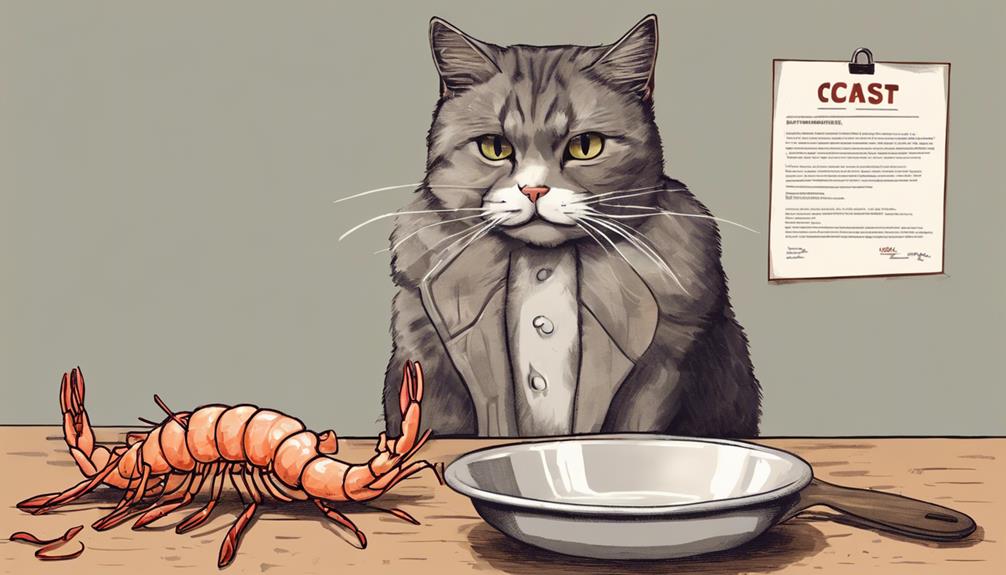
In considering final recommendations regarding feeding cats shrimp, it's important to prioritize their health and well-being. While shrimp can offer benefits for cats due to their high protein content and essential nutrients, it's vital to remember that shrimp should only be served occasionally and in moderation.
When offering shrimp to your feline friend, make sure it's thoroughly cooked and plain, with all shells, tails, and veins removed to prevent any choking hazards or digestive issues.
Monitoring your cat for any adverse reactions post-shrimp consumption is essential, and consulting your vet for guidance on the appropriate amount to include in their diet can be beneficial.
Frequently Asked Questions
Is Cooked Shrimp OK for Cats?
Cooked shrimp is safe for cats when plain and properly cooked. We should remove shells, heads, and tails to prevent choking. Remember, shrimp isn't a complete meal; it's a occasional treat due to high sodium.
Why Do Cats Love Shrimp?
Like moths to a flame, we're irresistibly drawn to shrimp due to their fishy scent, meaty texture, and taurine-rich goodness. It's a purrfect combo of protein, taste, and instinctual hunting vibes.
Can Cats Eat Crab or Shrimp?
We enjoy sharing that cats can eat both crab and shrimp as occasional treats. These high-protein options provide essential nutrients, but remember to remove shells, tails, and veins. Always monitor for allergic reactions or digestive issues.
Can Cats Eat Raw Fish or Shrimp?
We must never feed cats raw fish or shrimp due to the potential health risks involved. Cooking thoroughly is vital to guarantee their safety. We must prioritize our furry friends' well-being by offering them only well-prepared seafood.
Are Shrimp and Nuts Safe for Cats to Eat?
Shrimp is safe for cats to eat in small amounts as it provides protein and omega-3 fatty acids. However, nuts should be avoided as they can be hard to digest and may cause stomach upset or pancreatitis. In general, can cats eat nuts, but it is not recommended.
Conclusion
To sum up, while cats can enjoy shrimp as a tasty treat, it's important to provide it in moderation and make sure it's cooked properly.
Consider the nutritional benefits, opt for fresh shrimp over farmed options, and be mindful of any allergic reactions.
By following these guidelines, you can treat your feline friend to a delicious and nutritious snack without any worries. Remember, a happy cat is a happy household!
Paul’s love for animals knows no bounds. As a dedicated writer and animal lover, Paul brings a unique perspective to our team. His firsthand experiences with various animals enrich our content and provide valuable insights into their behavior and needs. Whether he’s sharing tips for pet care or shedding light on pressing conservation issues, Paul’s passion for animals shines through in everything he does.
Cats
Safe Flowers for Cats – A Comprehensive Guide
Safeguard your feline friend with our comprehensive guide to safe flowers, ensuring a blooming environment, but there's a crucial factor you don't want to miss!

When it comes to our furry friends, it is crucial to know which flowers are safe for them. Lilies, amaryllis, daffodils, and tulips are harmful to cats, causing symptoms such as vomiting and kidney damage. Prompt veterinary care is necessary if ingestion is suspected. Prevent toxicity by keeping toxic plants out of reach and using deterrents. Choose cat-friendly plants like Bromeliads and Roses to ensure a safe environment. Create pet-safe floral arrangements using roses and orchids. Remember, prioritizing safety for your feline friends is essential for a happy home. Make wise choices for a blooming safe space. Translated in US English: When it comes to our furry friends, knowing which flowers are safe for them is important. Lilies, amaryllis, daffodils, and tulips are toxic to cats, causing symptoms like vomiting and kidney damage. Quick vet care is essential if ingestion is suspected. Prevent toxicity by keeping toxic plants out of reach and using deterrents. Opt for cat-friendly plants like Bromeliads and Roses to guarantee a safe environment. Create pet-safe floral arrangements with roses and orchids. Remember, safety first for your feline friends is key to a happy home. Choose wisely for a blooming safe space.
Key Takeaways
- Choose cat-safe blooms like roses, orchids, and gerbera daisies.
- Avoid toxic flowers such as lilies, tulips, and daffodils.
- Opt for non-toxic alternatives like sunflowers, zinnias, and African violets.
- Keep flowers out of reach using safe plant stands or hanging planters.
- Educate yourself on toxic plants to ensure feline safety and wellness.
Flowers Toxic to Cats
When it comes to flowers toxic to cats, certain varieties like lilies pose a severe threat to our feline friends due to their potential to cause kidney damage. As much as we adore having vibrant blooms in our homes, it's important to be aware of the dangers certain flowers can pose to our beloved pets. Lilies, including Asiatic, Day, Easter, Japanese Show, and Tiger Lilies, contain toxins that can be extremely harmful if ingested by our curious cats. These beautiful flowers may add charm to our living spaces, but they're definitely not pet-safe flowers.
Being mindful of the potential risks associated with toxic flowers is vital for creating a safe environment for our furry companions. While we may enjoy the beauty and fragrance of various blooms, it's important to prioritize the well-being of our cats by steering clear of flowers like lilies, amaryllis, daffodils, tulips, chrysanthemums, hyacinths, iris, gladioli, and foxglove that can be dangerous if ingested. Let's make sure our homes are filled with not only lovely flowers but also with safety for our cherished feline friends.
Signs of Flower Toxicity in Cats
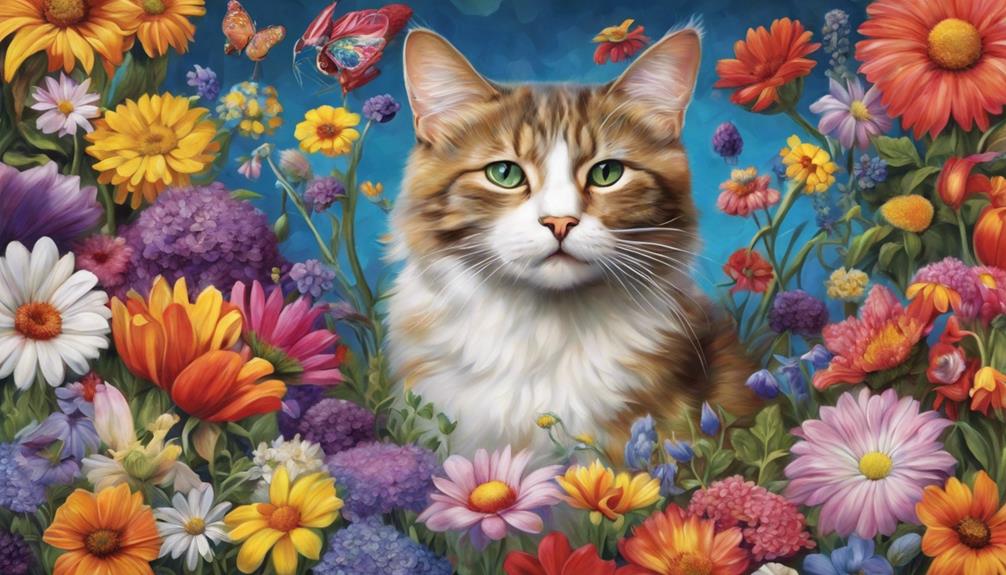
We must be vigilant for any signs of flower toxicity in our cats, as they can manifest as drooling, vomiting, lethargy, seizures, or even kidney damage.
Immediate veterinary attention is vital if we suspect our feline friends have ingested toxic flowers to prevent serious consequences.
Recognizing these warning signs promptly can help safeguard our beloved pets' well-being and guarantee a swift response in emergencies.
Toxicity Warning Signs
Identifying the signs of flower toxicity in cats is vital for ensuring prompt treatment and care. If your feline friend exhibits symptoms like drooling, vomiting, lethargy, seizures, or kidney damage, it could be due to flower toxicity.
Remember, the signs may vary depending on the type of flower ingested. In cases of emergency, urgent vet consultation is essential to address the situation promptly. Some flowers may cause immediate reactions in cats, while others could lead to delayed toxicity symptoms.
Being vigilant and recognizing these warning signs can make a significant difference in your cat's well-being. If you suspect your cat has ingested a toxic flower, don't hesitate to seek professional help to guarantee the best possible outcome for your beloved pet.
Immediate Vet Attention
Recognizing the signs of flower toxicity in cats is vital for ensuring prompt veterinary care and treatment. If your feline friend exhibits symptoms like drooling, vomiting, lethargy, seizures, or kidney damage after potentially ingesting a toxic plant, immediate vet attention is essential. Cats can display immediate or delayed reactions to toxic plants, underscoring the need for urgent veterinary consultation in emergencies. To help you understand the importance of acting swiftly, here is a table summarizing signs that may indicate flower toxicity in cats:
| Sign of Flower Toxicity | Action Needed |
|---|---|
| Drooling | Seek veterinary care |
| Vomiting | Contact a vet immediately |
| Lethargy | Consult a vet promptly |
| Seizures | Immediate veterinary attention |
Importance of Prompt Veterinary Attention
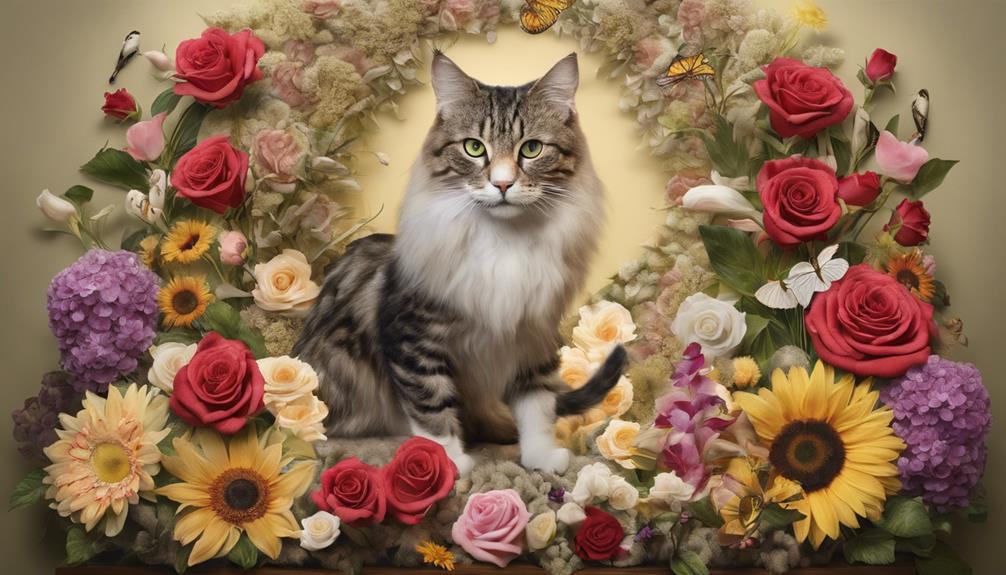
Seeking immediate veterinary care is vital in preventing serious health complications for cats who've ingested toxic flowers. When a feline friend gets into a harmful plant, time is of the essence. Quick veterinary attention can make all the difference in saving your cat's life.
Even if your cat shows no immediate symptoms after nibbling on a toxic flower, it's essential to seek prompt veterinary care. Veterinarians have the expertise to provide specific treatments tailored to the type and severity of flower toxicity. Their interventions can help mitigate the effects of the poisonous plants on your cat's health.
Preventing Cat Exposure to Toxic Plants

When creating a safe environment for cats, it's essential to keep toxic plants out of their reach to prevent accidental ingestion. Consider using hanging planters or placing plants on tall furniture to discourage cats from exploring them.
It's also helpful to train cats to avoid toxic plants through positive reinforcement techniques.
Plant-Safe Home Environment
To maintain the safety of our feline companions, it's crucial to establish a plant-friendly home environment that guarantees cats aren't exposed to toxic plants. Place plants out of reach on high shelves or in hanging planters to prevent cats from accessing toxic flowers.
Utilize deterrents like bitter apple spray on plants to discourage cats from nibbling on them. Research and identify common toxic plants to avoid bringing them into your home environment.
Monitor your cat's behavior around plants and flowers to make sure they don't ingest anything harmful. Additionally, create a safe designated area with cat-friendly plants like cat grass or catnip to satisfy their natural curiosity.
Cat-Friendly Flower Choices
In selecting cat-friendly flower choices, we prioritize safety by opting for plants like Bromeliads, Gerbera Daisies, and Bamboo Palm to prevent potential toxicity.
- Bromeliads: Their vibrant colors add beauty without posing a threat to your curious feline friend.
- Gerbera Daisies: These cheerful blooms aren't only safe for cats but also a delightful addition to your home decor.
- Bamboo Palm: With its air-purifying qualities, this plant not only keeps the air fresh but also keeps your cat safe.
- Roses: A classic choice that's safe for cats, perfect for showing love without compromising on safety.
- Hibiscus: Bring a tropical touch to your space while ensuring your cat's well-being with these colorful flowers.
Toxic Plant Awareness
Raising awareness about toxic plants and their risks to cats is crucial for ensuring their well-being and safety in our homes. Cats, with their curious nature, may come across toxic flowers like lilies, daffodils, and chrysanthemums, leading to severe health issues such as vomiting, lethargy, and kidney damage.
It's important to act promptly by contacting a vet if your feline friend ingests any toxic plants to prevent further complications. Opt for cat-safe bouquet options like gerbera daisies, sunflowers, and bromeliads to adorn your home without risking your pet's health.
Choosing Cat-Safe Blooms
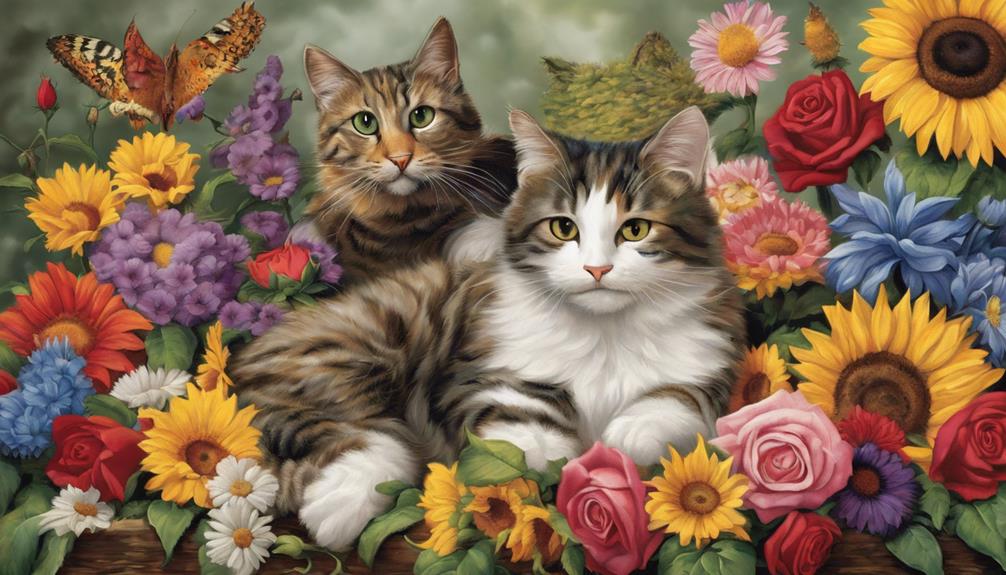
When selecting flowers for your home with cats, it's crucial to choose cat-safe blooms that are non-toxic and pose no harm to your feline companions. Here are some tips to assist you in picking the best blooms for your furry friends:
- Opt for African violets, roses, orchids, and zinnias, as these are non-toxic and safe for cats.
- These flowers not only add vibrant colors to your space but are also low-maintenance, ideal for homes with playful feline friends.
Prioritize your cat's well-being by surrounding them with safe blooms that won't harm them if nibbled on.
- Avoid toxic flowers like lilies, tulips, and daffodils, which can cause serious health issues if ingested by cats.
Recognizing Symptoms of Flower Toxicity
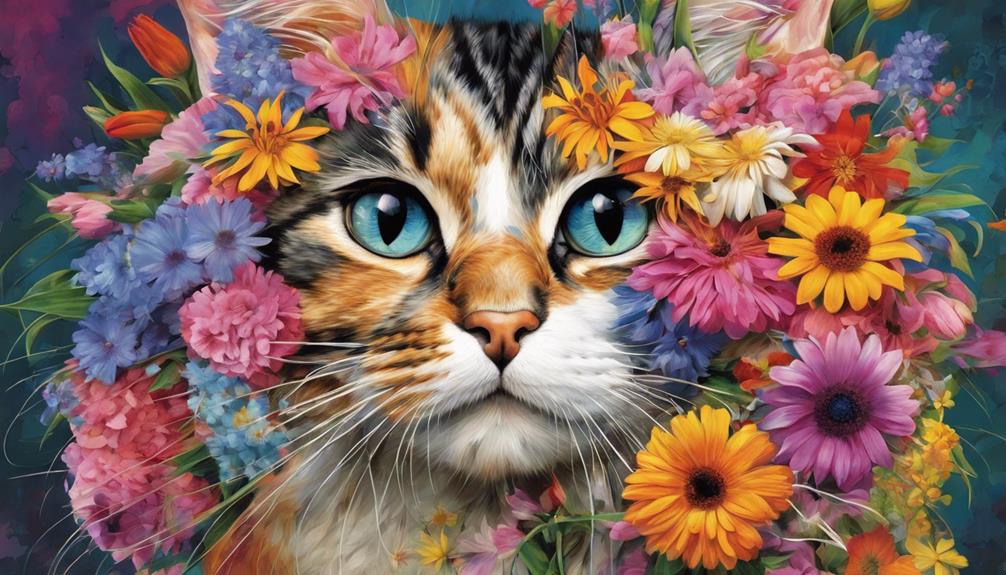
After selecting safe flowers for your cats, it's important to be able to recognize symptoms of flower toxicity to guarantee your feline friends' well-being. Symptoms of flower toxicity in cats can vary from drooling and vomiting to more severe signs like lethargy, seizures, and kidney damage. Whether immediate or delayed, these signs can indicate that your cat has ingested a toxic bloom.
Being vigilant and noticing these symptoms promptly is essential in identifying and addressing potential flower toxicity in your furry companions. If you notice any of these signs, it's necessary to act quickly and seek urgent veterinary consultation. In emergency cases of flower toxicity, contacting an emergency vet is essential for your cat's well-being.
Hazardous Blooms to Avoid

To protect your cats' health, it's crucial to steer clear of hazardous blooms like lilies, amaryllis, daffodils, tulips, chrysanthemums, and hyacinths.
- Lilies, for example, can lead to severe kidney damage in cats if ingested.
- Amaryllis, while beautiful, can cause symptoms like vomiting and lethargy in our feline friends.
- Daffodils may result in drooling and abdominal pain if your cat decides to take a bite.
- Tulips, although lovely, can bring about symptoms such as diarrhea and increased heart rate in cats.
- Chrysanthemums and hyacinths are also on the list of flowers to avoid, as they can cause seizures and skin irritation in our furry companions.
Creating Pet-Friendly Floral Arrangements

Let's make our floral arrangements cat-friendly by choosing safe blooms like roses, orchids, and gerbera daisies. These non-toxic flowers not only brighten up our homes but also keep our feline friends safe and sound.
When creating pet-friendly floral displays, it's important to avoid toxic options such as lilies, tulips, and daffodils that can harm our beloved cats.
Incorporating non-toxic alternatives like sunflowers, zinnias, and African violets guarantees that our floral arrangements aren't only beautiful but also safe for our furry companions. To further protect our pets, it's vital to keep these flowers out of reach of curious cats. Utilizing safe plant stands or hanging planters can help prevent any unwanted interactions between our cats and the flowers.
Cat-Safe Alternatives to Toxic Plants

When it comes to keeping our feline friends safe, knowing which plants are toxic is essential. Luckily, there are plenty of cat-friendly flower options that can brighten up our homes without posing any risks to our pets.
Toxic Plants Risks
Exploring cat-safe alternatives to toxic plants reveals numerous non-toxic options that can enhance your feline companion's environment while minimizing health risks. When choosing plants for your home, consider these safe options:
- Bromeliads: These colorful and exotic plants are safe for cats and add a tropical touch to your space.
- Gerbera Daisies: Bright and cheerful, these flowers are a safe choice that won't harm your furry friend.
- Bamboo Palms: Not only are they non-toxic to cats, but they also purify the air, creating a healthier atmosphere.
- Orchids: Elegant and pet-friendly, orchids are a beautiful addition to any cat-friendly home.
- Roses: Classic and romantic, roses are safe for cats and come in various colors to suit your style.
Cat-Friendly Flower Options
When selecting cat-friendly flower options for your home, prioritize safety by choosing non-toxic plants that enhance your space without posing risks to your feline friend.
Think about adding Bromeliads, Gerbera Daisies, and Bamboo Palm to your bouquet choices for a pop of color that won't harm your curious cat.
Majesty Palm, Marigold, and Sunflowers are excellent non-toxic flower options that can brighten up your living space while ensuring your cat's well-being.
For a touch of nature without the worry, Birds Nest Fern, Orchids, and Swedish Ivy are safe plant alternatives to think about.
And if you're looking for more cat-friendly choices, Purple Velvet Plants, Rattlesnake Plants, and Impatiens offer a natural touch without any toxic effects on your beloved pet.
Pet-Safe Gardening Tips
To guarantee the safety and well-being of your feline companion, consider incorporating cat-safe alternatives into your gardening routine, such as cat grass, catnip, mint, or catmint.
- Plant cat grass, catnip, mint, or catmint to fulfill your cat's natural plant-chewing instincts.
- Set up a special cat garden with safe options like spider plants and cat thyme.
- Steer clear of toxic plants like lilies, tulips, and daffodils in your garden.
- Provide vertical climbing structures with cat-friendly plants to keep your pet engaged.
- Keep your cat mentally stimulated with interactive toys to deter them from exploring harmful plants.
Ensuring Feline Well-Being

How can we guarantee the well-being of our feline friends when it comes to choosing flowers for our homes? It's important to prioritize our cats' safety by opting for cat-safe flowers like African violets, asters, and roses. By steering clear of toxic flowers such as lilies, daffodils, tulips, and chrysanthemums, we can create a space that's both beautiful and secure for our furry companions. Pet-friendly options like orchids, zinnias, and sunflowers provide vibrant decoration without posing any risks to our beloved cats.
To ensure a cat-friendly environment, consider selecting non-toxic flowers like roses, marigolds, and impatiens. By researching cat-safe bouquet options and avoiding harmful plants like foxglove and iris, we can actively contribute to our feline friends' well-being. Remember, our cats rely on us to provide a safe and nurturing space, so let's make informed choices when it comes to selecting flowers for our homes.
Toxicity Risks for Cats
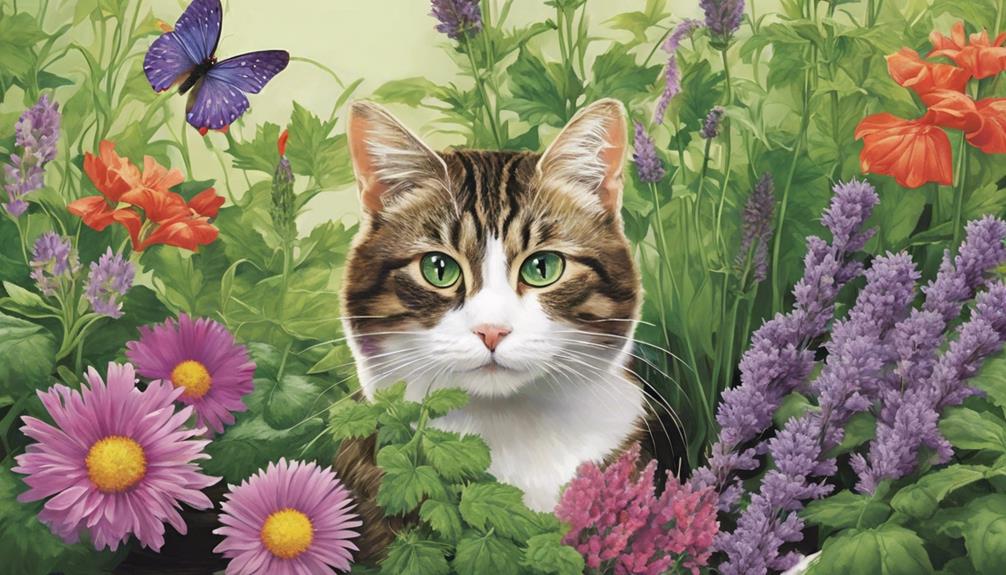
Choosing flowers for your home requires careful consideration to avoid exposing your beloved feline companions to potential toxicity risks. When it comes to keeping your cats safe, here are some essential points to keep in mind:
- Some common flowers like lilies, daffodils, tulips, and chrysanthemums can pose significant toxicity risks for cats.
- Ingesting these toxic flowers can result in symptoms such as vomiting, drooling, lethargy, seizures, and even kidney damage in cats.
It's vital to seek immediate veterinary consultation if you suspect your cat has ingested a toxic flower.
- Opt for cat-safe bouquet options like bromeliads, gerbera daisies, marigolds, sunflowers, orchids, and roses to guarantee a safe environment for your feline friends.
- Preventing cat exposure to toxic flowers and choosing cat-safe plants are fundamental steps in promoting the well-being of your beloved pets.
Emergency Actions for Flower Ingestion

When a cat ingests flowers, contacting the vet immediately is vital for proper guidance and quick action. Providing the vet with details about the ingested flower can aid in accurate treatment.
Vet Consultation Importance
In cases of flower ingestion by cats, immediate vet consultation is essential to prevent serious health issues and guarantee timely intervention for the well-being of the cat. When facing such a situation, here are key reasons why contacting a vet promptly is important:
- Assessment of Toxicity: Vets can determine how harmful the ingested flowers are.
- Treatment Recommendations: They'll suggest the best course of action for the cat's specific situation.
- Monitoring for Adverse Effects: Vets will keep a close eye on the cat's condition for any negative developments.
- Life-Saving Interventions: Quick vet intervention can be crucial in saving the cat's life.
- Ensuring Well-being: Consulting a vet promptly is fundamental for the cat's recovery and overall health.
Immediate Vet Visit
Taking immediate action in response to flower ingestion by cats is vital for ensuring their well-being and health. If your pet ends up ingesting a toxic flower, it's essential to rush them to the vet without delay. Symptoms of flower toxicity can escalate quickly, necessitating emergency treatment.
A prompt vet consultation is necessary to provide the best care and interventions for your furry friend in case of ingestion. Remember, contacting the vet right away can be a life-saving decision for your cat and may prevent severe consequences.
Time is of the essence when it comes to dealing with flower ingestion in pets, so don't hesitate to seek professional help to safeguard your beloved feline companion's health.
Safe Floral Options for Cat Owners

As cat owners, we prioritize the well-being of our feline friends by choosing safe floral options to adorn our homes. When selecting flowers that won't harm our beloved pets, consider these cat-safe options:
- African violets: These vibrant flowers add a pop of color to any room and are safe for curious cats to be around.
- Roses: Classic and elegant, roses are a timeless choice that pose no threat to our furry companions.
- Sunflowers: Bright and cheerful, sunflowers bring a touch of sunshine indoors without risking our cats' health.
- Orchids: Known for their beauty and grace, orchids are a safe and sophisticated floral option for cat owners.
- Zinnias: With their diverse colors and shapes, zinnias are a playful choice that won't harm our feline friends.
Cat-Friendly Flower Selection Guide
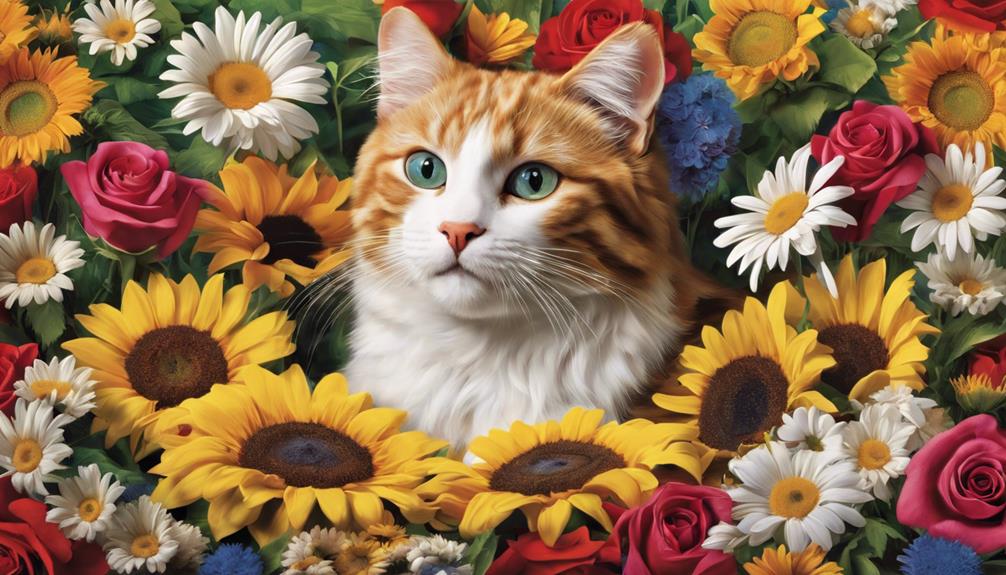
When considering floral options safe for cats, it's crucial to choose varieties like asters, celosia, orchids, roses, sunflowers, and zinnias to guarantee a pet-friendly environment. These cat-safe flowers are non-toxic to cats, ensuring your furry friends can roam freely without the worry of harmful effects. By incorporating these blooms into your home, you not only add a touch of nature but also create a safe haven for your beloved feline companions.
Opting for cat-friendly bouquets not only brightens up your living space but also promotes a healthy atmosphere for your pets to thrive in. It's important to steer clear of toxic flowers like lilies, tulips, daffodils, chrysanthemums, and hyacinths when sharing your home with cats. Making informed choices when selecting flowers showcases your commitment to providing a safe and nurturing environment for your cats. So, next time you arrange a floral display, remember to prioritize cat-safe options to ensure a harmonious coexistence between nature and your furry friends.
Cat Care and Flower Safety
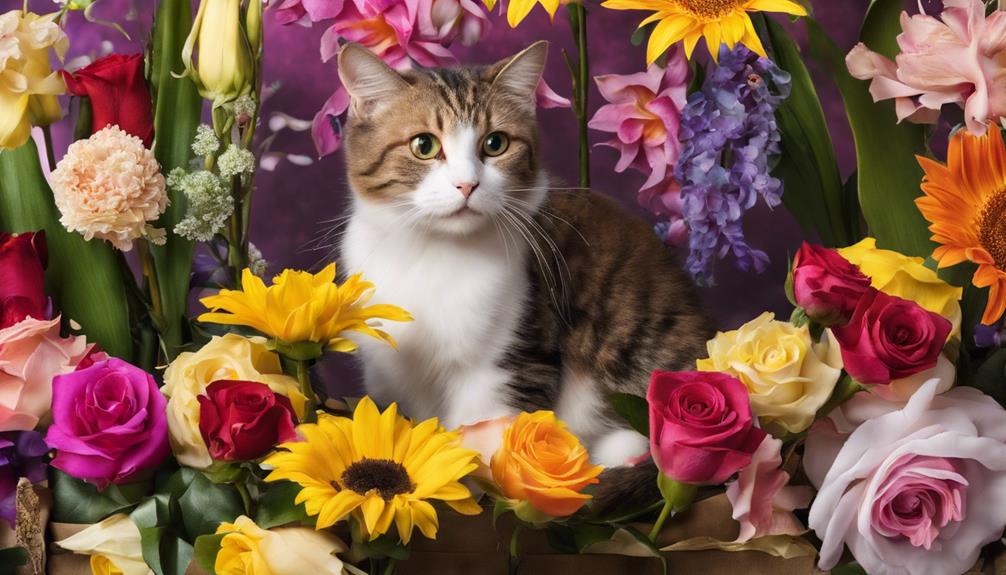
To ensure the well-being of our feline companions, it's vital to understand the importance of cat care and flower safety in our homes. When it comes to keeping our cats safe from toxic flowers, here are some essential tips to keep in mind:
- Know the Culprits: Educate yourself on common toxic flowers like lilies, amaryllis, daffodils, tulips, chrysanthemums, and hyacinths to prevent any accidental ingestion by your curious cat.
- Watch for Signs: Be vigilant for symptoms of flower toxicity in cats such as drooling, vomiting, lethargy, seizures, or kidney damage, and seek immediate veterinary help if you suspect any issues.
- Opt for Cat-Safe Bouquets: Choose cat-friendly blooms like bromeliads, gerbera daisies, orchids, marigolds, sunflowers, and roses to adorn your home without jeopardizing your feline friend's health.
- Prevent Exposure: Keep toxic flowers out of reach and consider placing cat-safe plants in your living spaces to create a safe environment for your beloved pet.
- Prioritize Feline Wellness: By being mindful of flower safety and cat care, you can strengthen the bond with your cat and promote their overall well-being.
Frequently Asked Questions
Can Cats Develop Allergies to Certain Safe Flowers?
Yes, cats can develop allergies to certain safe flowers. It's important to monitor your feline friend for any signs of allergic reactions like sneezing or skin irritation. Consult your vet if you suspect any issues.
Are There Any Non-Toxic Flowers That Are Especially Appealing to Cats and May Attract Them to the Garden or Home?
In our experience, catnip is a magnet for felines. Its allure is like a siren's call, drawing cats with its irresistible scent. Planting catnip in your garden or home can create a playful paradise for your fur babies.
How Can Cat Owners Safely Introduce New Flowers Into Their Environment Without Risking Their Cat's Health?
When introducing new flowers, we make sure they are safe for our cat by researching pet-friendly options. We gradually bring them into our space, observing our cat's reactions. Consulting with a veterinarian helps us guarantee our cat's health and happiness.
Are There Any Natural Remedies or Supplements That Can Help Alleviate Symptoms of Flower Toxicity in Cats Before Seeking Veterinary Attention?
We can try natural remedies like activated charcoal or probiotics to help ease flower toxicity symptoms in our cats. However, if symptoms persist or worsen, it's essential to seek immediate veterinary attention for proper care.
How Can Cat Owners Easily Identify and Differentiate Between Safe and Toxic Flowers When Shopping for Floral Arrangements or Plants for Their Home?
We choose petal-perfect bouquets by glancing at petals. Choosing safe flowers involves consulting lists, like lilies that we avoid, for felines. Identify toxic blooms by referring to guides for assistance. It's crucial for our pets.
Can Black and White Cats Have Adverse Reactions to Certain Flowers?
Some black and white cat breeds may have adverse reactions to certain flowers, such as lilies and daffodils, which can be toxic to cats if ingested. It’s important for pet owners to be aware of the potential dangers and to keep these harmful plants out of reach of their feline friends.
Conclusion
In the blooming garden of cat safety, it's crucial to select flowers wisely to guarantee our furry friends stay healthy and happy.
By avoiding toxic blooms and choosing cat-friendly options, we can establish a sanctuary where our feline companions can play without concern.
Remember, a petal's allure may be irresistible, but a watchful eye and a thoughtful selection of safe flowers will keep our cats purring with delight.
Paul’s love for animals knows no bounds. As a dedicated writer and animal lover, Paul brings a unique perspective to our team. His firsthand experiences with various animals enrich our content and provide valuable insights into their behavior and needs. Whether he’s sharing tips for pet care or shedding light on pressing conservation issues, Paul’s passion for animals shines through in everything he does.
Cats
The Ultimate List: Revealing 5 Orange Cat Cartoon Names
Unveil the ultimate list of orange cat cartoon names that will leave you eager to discover more feline fun!
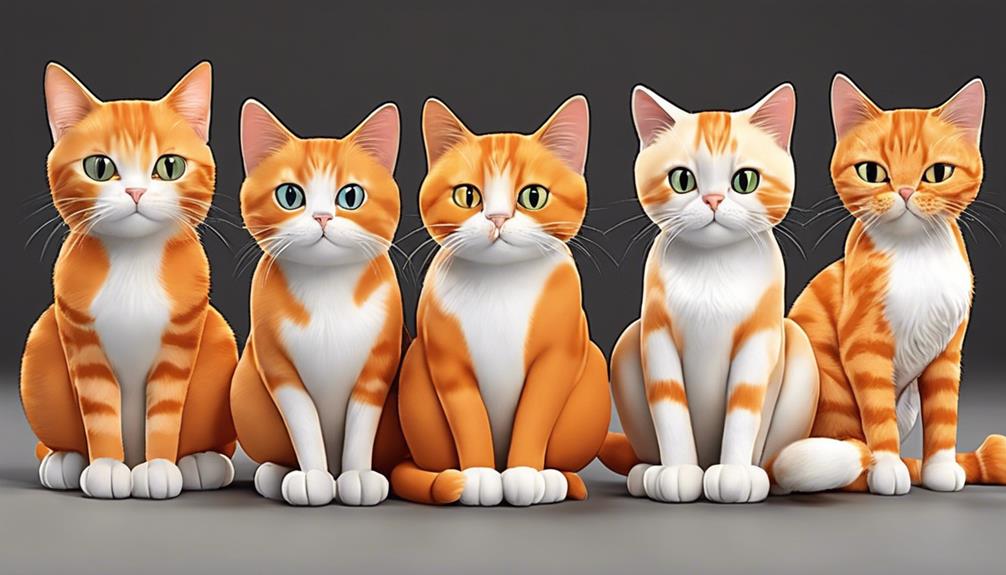
When it comes to names for orange cat cartoons, rest assured that we have the ultimate list for you. Classic favorites like Garfield, Heathcliff, and Figaro bring joy with their distinct personalities. For a quirky twist, consider Amanojaku, Autocat, or Artemis, each adding a unique charm to their respective shows. Looking for timeless appeal? Characters like Berlioz, Azrael, and Babbit and Catstello have stood the test of time, bringing laughter and entertainment to audiences. These iconic orange cartoon kitties and beloved TV show cat characters continue to captivate viewers with their vibrant fur and unforgettable traits. More feline fun awaits!
Key Takeaways
- Amanojaku from Ghost Stories: Mischievous and playful orange feline character.
- Autocat from Motormouse and Autocat: Competitive and cunning orange cat.
- Artemis from Sailor Moon: Loyal and intelligent guardian to the Sailor Scouts.
- Azrael from Smurfs: Beloved loyal companion with a playful personality.
- Beans from Merrie Melodies: Joyful orange cartoon kitty in animated shorts.
Classic Cartoon Cat Names
Exploring classic cartoon cat names reveals beloved characters like Garfield, Heathcliff, and Figaro, cherished across generations for their memorable antics and playful personalities. Garfield, a creation of Jim Davis, has captured the hearts of many with his lasagna-loving, lazy yet lovable persona. The witty and sarcastic Garfield, with his iconic orange fur, has become a household name worldwide.
Heathcliff, another famous orange feline, is known for his daring adventures and mischievous escapades. Whether he's outsmarting his rivals or causing chaos in the neighborhood, Heathcliff's bold personality makes him a standout character in the world of cartoon cats.
Figaro, the charming kitten from Disney's Pinocchio, brings a touch of sweetness with his playful and curious nature. Despite his small size, Figaro's big heart and endearing antics have endeared him to audiences of all ages.
These classic cartoon cat names have left a lasting impression on popular culture, showcasing the enduring appeal of orange feline characters in the world of animation.
Quirky Orange Feline Characters
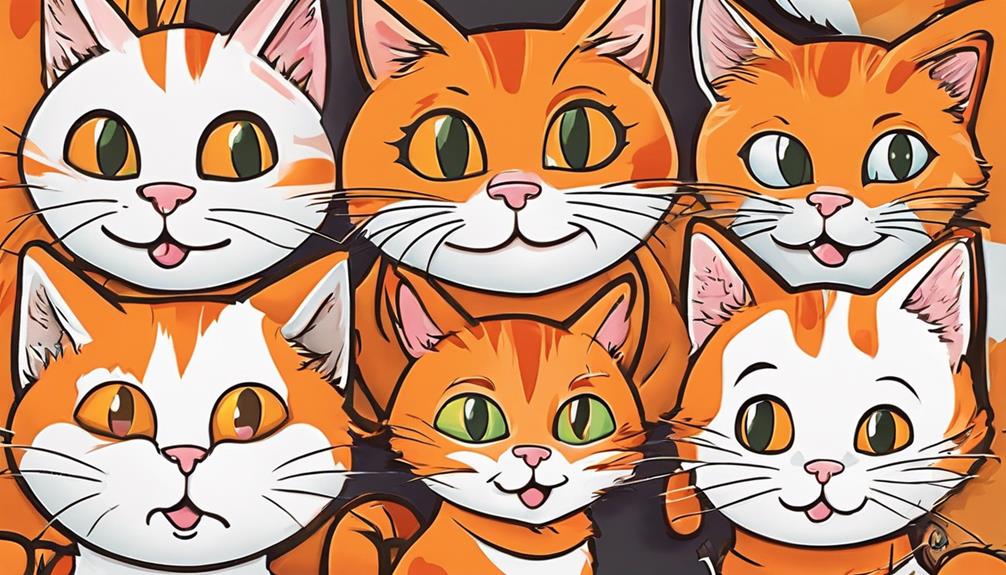
Taking a closer examination of some quirky orange feline characters uncovers their unique personalities and memorable traits in the world of cartoons. Let's explore a few of these fascinating characters:
| Orange Feline Characters | Description |
|---|---|
| Amanojaku | Known for its mischievous and playful nature in Ghost Stories. |
| Autocat | An orange cat with a competitive and cunning personality in Motormouse and Autocat. |
| Artemis | A loyal and intelligent orange cat who serves as a guardian to the Sailor Scouts in Sailor Moon. |
These quirky orange feline characters bring a diverse range of traits to the screen, from mischievous antics to loyal guardianship. Whether it's Amanojaku's playful nature, Autocat's competitive streak, or Artemis' intelligence, each character adds depth and charm to the cartoons they inhabit. Stay tuned for more insights into other beloved orange cat characters in the upcoming sections.
Timeless Animated Cat Personalities
Exploring the domain of classic animated cat personalities reveals a plethora of enchanting characters with lasting charm and appeal. These timeless animated cat personalities have captured the hearts of audiences and continue to be celebrated for their unique traits and roles in various series.
From Amanojaku in Ghost Stories, known for its distinct personality, to Artemis in Sailor Moon, a beloved character with a significant presence in the storyline, each orange cat brings something special to the screen. Berlioz from The Aristocats charms viewers with his musical talents, while Azrael in Smurfs often finds himself tangled in Gargamel's schemes, adding an element of humor to the show.
Additionally, Babbit and Catstello from Merrie Melodies are iconic orange cat characters celebrated for their comedic interactions. These animated felines have stood the test of time, leaving a lasting impression on audiences with their memorable appearances and engaging personalities.
Iconic Orange Cartoon Kitties
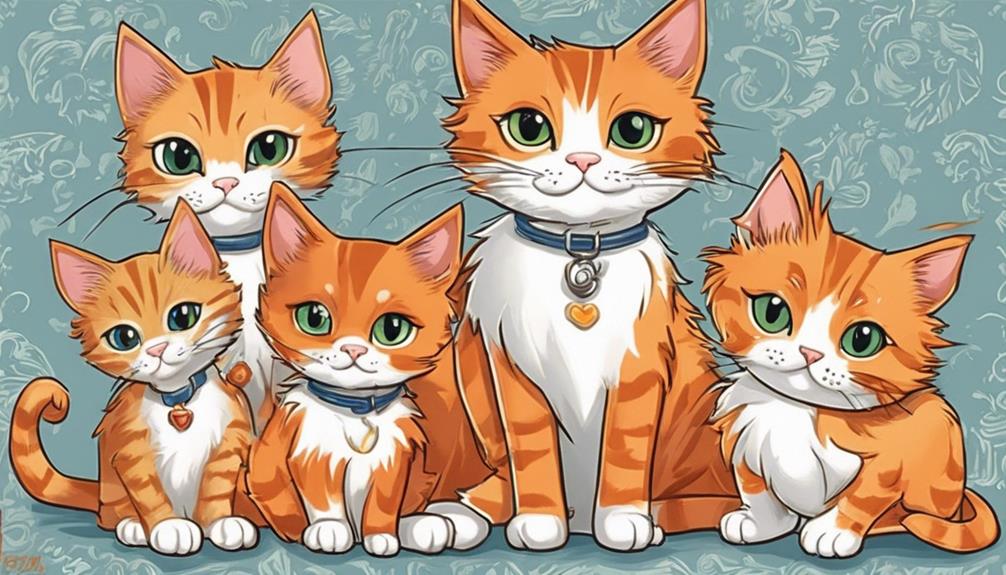
From mischievous Amanojaku in Ghost Stories to the wise Artemis in Sailor Moon, iconic orange cartoon kitties have left a lasting mark on animated entertainment. These feline characters have charmed our hearts with their unique traits and personalities.
Azrael from Smurfs is a beloved orange cartoon cat who stands out as the loyal companion of the cunning Gargamel. Beans from Merrie Melodies is a classic orange cartoon cat character that has appeared in numerous animated shorts, bringing joy to audiences with its antics. Berlioz from The Aristocats is a charming orange cartoon kitten known for his musical talent, adding a touch of elegance to the screen.
Each of these iconic orange cartoon kitties has contributed to the rich tapestry of animated storytelling, enchanting viewers of all ages with their vibrant orange fur and unforgettable personas.
Beloved TV Show Cat Characters
Among the beloved TV show cat characters, Autocat from Motormouse and Autocat stands out as a memorable orange cat cartoon character. Autocat's cunning schemes to catch Motormouse made for entertaining television moments, enchanting audiences with his orange fur and mischievous antics.
Amanojaku from Ghost Stories is another notable orange cat in the domain of TV show characters. This feline character added a mysterious and intriguing element to the show, leaving viewers intrigued by its enigmatic nature.
Artemis from Sailor Moon also deserves a special mention, charming audiences with his wisdom and loyalty as a beloved orange cat companion.
Azrael, the adorable orange cat from Smurfs, won the hearts of viewers with his playful and endearing personality.
Frequently Asked Questions
What Is the Name of the Orange Cartoon Cat?
It is common knowledge that the orange cartoon cat is Garfield. Created by Jim Davis in 1978, Garfield is renowned for his lasagna love and sarcastic humor. His iconic orange fur and witty charm have captivated audiences for decades.
What Is a Great Name for a Orange Cat?
We love naming our orange cats with flair! A perfect choice depends on their fiery spirit. Consider Marigold for a touch of nature, or Ember to match their warm hues. Let's find the ideal fit!
Who Is the Most Famous Fictional Cat?
We believe the most famous fictional cat is Garfield. Created in 1978 by Jim Davis, Garfield's witty humor and love for lasagna have made him a cultural icon. His adventures have entertained audiences of all ages for decades.
What Is Cartoon Cat's Name?
Cartoon Cat's name is Amanojaku in Ghost Stories, Autocat in Motormouse and Autocat, Artemis in Sailor Moon, Azrael in Smurfs, and Babbit and Catstello in Merrie Melodies. These feline characters are known for their unique personalities and adventures.
Can I Use Anime Cat Girl Names for My Orange Cat Cartoon?
Yes, you can definitely use adorable anime cat girl names for your orange cat cartoon! These names are perfect for adding a cute and unique touch to your character. From Nala to Luna, the possibilities are endless. Your audience will love the creativity and charm these names bring to your orange cat cartoon.
Conclusion
As we conclude our exploration of orange cat cartoon names, we hope you have enjoyed discovering some of the most iconic and beloved feline characters in animation.
Remember, whether you prefer classic cartoon cats or quirky orange kitties, there's a character out there for everyone.
Stay tuned for more fun and informative articles on your favorite cartoon characters! Keep watching, keep smiling, and keep loving those orange cat cartoons.
As our Editor-in-Chief, James plays a pivotal role in ensuring the quality and integrity of our content. With a keen eye for detail and a passion for storytelling, James oversees the editorial process here at A Place for Animals. With years of experience in content editing, James ensures that every piece of content meets our high standards of accuracy and clarity. Under James’ guidance, you can rest assured that the content you read is informative and impeccably crafted.
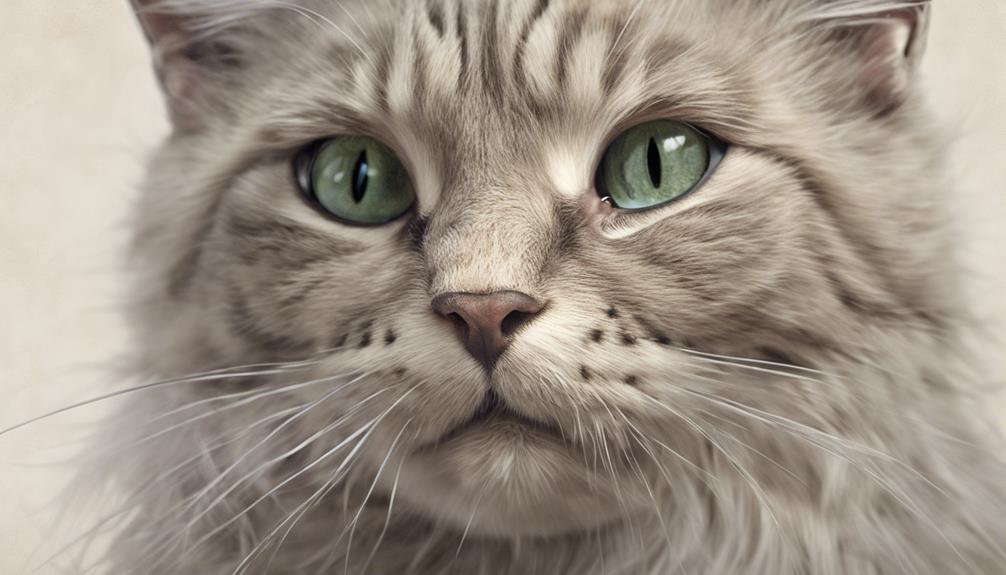
When it comes to dealing with cat chin mites, it is important to use effective treatments. Options like selamectin, lime sulfur dips, or ivermectin are aimed at getting rid of mites and alleviating symptoms such as itching, redness, and hair loss. Topical solutions like fipronil or medicated shampoos are specifically designed to target and eliminate mites in the affected chin area. To prevent future occurrences, it is essential to maintain regular chin hygiene, address underlying causes, and seek advice from a veterinary professional. For relief, it is recommended to consistently apply prescribed treatments, handle your cat with care, and follow up with your vet as needed. Prioritizing your cat’s comfort by providing soft bedding and a peaceful environment can help with the recovery process. Stay informed for more helpful tips and strategies.
Key Takeaways
- Selamectin, ivermectin, lime sulfur dips, or insecticides are effective treatments.
- Topical solutions like fipronil and medicated shampoos target and eliminate mites.
- Treatments aim to relieve itching, redness, hair loss, and skin inflammation.
- Consult a veterinarian for proper diagnosis and tailored treatment plans.
- Regular chin hygiene, grooming, and monitoring aid in long-term prevention and well-being.
Understanding Cat Chin Mites
When dealing with cat chin mites, understanding the nature of these parasitic invaders is vital for effective treatment. These tiny mites, such as Demodex, Otodectes, Cheyletiella, Notoedres, and Sarcoptes, target the delicate skin of a cat's chin, causing discomfort and irritation. Diagnosis of cat chin mites typically involves a close examination of the skin through skin scrapings or microscopic evaluation to confirm the presence of these pesky parasites.
Once the diagnosis is established, appropriate treatment measures can be initiated to combat these mites effectively. Treatment options for cat chin mites may include medications like selamectin, ivermectin, lime sulfur dips, or other insecticides prescribed by a veterinarian. These treatments are aimed at eliminating the mites from the cat's skin and providing relief from the associated symptoms like itching, redness, and hair loss.
Understanding the behavior and characteristics of these mites is essential in addressing the issue promptly and preventing further discomfort for our feline companions.
Symptoms of Cat Chin Mites

To identify cat chin mites, pay attention to symptoms like itching, redness, and inflammation in the chin area. When dealing with cat chin mites, it's important to be mindful of the following signs:
- Itching: Cats with chin mites may experience intense itching in the chin region, leading them to scratch frequently.
- Redness: The affected area on the chin may appear red and irritated due to the presence of mites.
- Inflammation: Swelling and discomfort are common symptoms of cat chin mites, causing inflammation for the feline friend.
If you observe your cat showing these signs, it's vital to take prompt action to address the issue effectively. Look out for additional indicators such as hair loss, scabs, or crusts, as these could also indicate a cat chin mite infestation. Early detection plays a crucial role in managing symptoms and preventing further skin complications in cats affected by chin mites.
Causes of Cat Chin Mites

Cat chin mites are mainly caused by Demodex mites, small parasites that reside in the hair follicles and sebaceous glands on the chin. These mites can result in various skin issues such as irritation, infection, redness, and even open sores on the affected area.
Understanding the origins of cat chin mites is essential in recognizing the symptoms of infestation and exploring the treatment options available.
Cat Chin Mites Origins
Originating from tiny Demodex mites residing in the hair follicles and sebaceous glands of cats, cat chin mites commonly trigger various skin issues. These mites can lead to skin irritation, infections, hair loss, redness, inflammation, scabs, crusts, and open sores. Understanding the root cause of cat chin mites is essential in addressing the condition effectively.
Here are some key points to keep in mind:
- Demodex mites infest cat chins, causing skin problems.
- The presence of these mites can result in a range of skin irritations.
- Proper diagnosis and treatment are vital to managing cat chin mites and alleviating associated skin issues effectively.
Symptoms of Infestation
Symptoms of cat chin mite infestation typically manifest as itching, redness, hair loss, scabs, and inflammation in the chin area. Cats afflicted by these mites may exhibit visible signs such as hair loss, crusting, red bumps, and open sores on their chin.
These skin problems can be worrisome for our feline friends, causing discomfort and irritation. It's important to pay attention to these symptoms as they can indicate a deeper issue like cat chin mites. Identifying these signs early on allows for prompt treatment, preventing further skin complications.
Treatment Options Available
When addressing cat chin mites, understanding the available treatment options is essential for effectively combating the infestation and restoring the affected feline's skin health.
Treatment options include:
- Medication: Your vet may prescribe topical or oral medications to kill the mites and alleviate skin irritation.
- Antibiotics: In cases where secondary infections occur due to cat chin mites, antibiotics might be necessary to treat the infection.
- Topical Treatments: Specialized ointments or shampoos can help soothe the affected area and promote healing of any skin lesions caused by the mites.
Diagnosis of Cat Chin Mites

To diagnose cat chin mites accurately, veterinarians typically perform skin scraping to identify the presence of mites in the hair follicles and sebaceous glands. This process involves collecting a small sample of skin cells from the affected area to examine under a microscope.
A critical examination by the veterinarian is necessary for spotting the characteristic signs of chin mites, such as redness, crusting, or hair loss. By conducting a trichogram, veterinarians can further inspect the mites closely and confirm the diagnosis.
Demodex mites, which cause skin irritation and infection, can be detected through microscopic evaluation of skin samples. It's essential for veterinarians to differentiate between cat chin mites and other skin conditions like chin acne to provide the appropriate treatment.
Through these diagnostic methods, veterinarians can accurately identify cat chin mites and devise a targeted treatment plan to alleviate discomfort and promote healing.
Topical Treatments for Cat Chin Mites
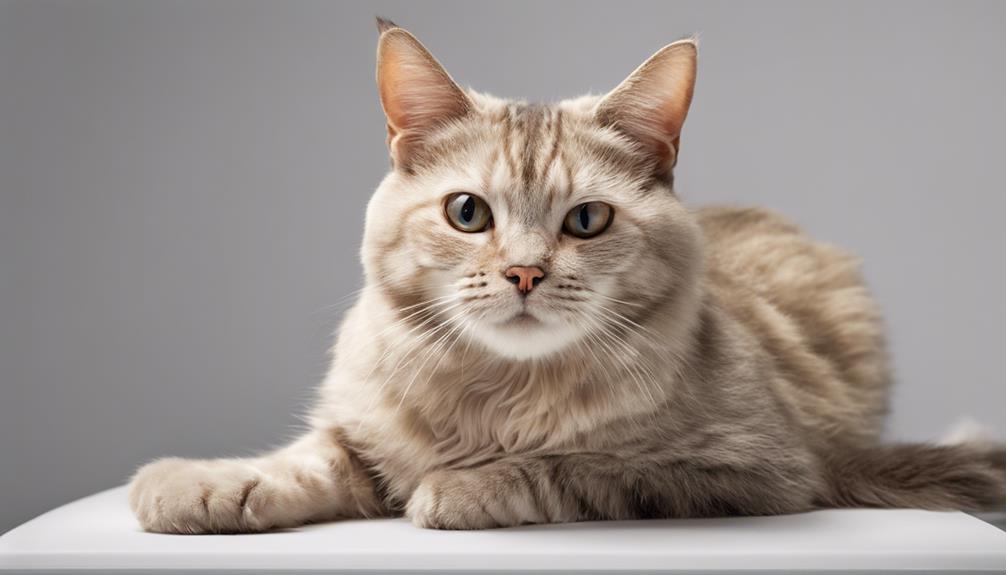
When managing cat chin mites, applying topical treatments is an important step in effectively targeting and eliminating the mites causing irritation and skin issues. These treatments are specifically designed to combat the pesky mites on your cat's chin area. Some topical solutions contain potent ingredients like selamectin or fipronil, known for their efficacy in eradicating mites effectively.
Here are three key points to contemplate regarding topical treatments for cat chin mites:
- Medicated shampoos or ointments: These products are formulated to kill mites on the chin area, providing direct relief to your cat.
- Selamectin and fipronil: These components are highly effective against mites and are commonly found in topical treatments recommended by veterinarians.
- Targeted application: Applying the treatment directly to the affected chin area helps in targeting and eliminating the mites responsible for the skin issues, promoting healing and restoring skin health in your cat.
Importance of Proper Hygiene

Maintaining proper hygiene practices is essential for preventing and managing cat chin mites infestations. Cats are susceptible to chin mites, which can cause discomfort and irritation if not addressed promptly. Regular cleaning of your cat's chin area is vital in reducing the risk of mite infestations.
By using vet-recommended cleaning solutions and products, you can effectively control and manage these pesky parasites. Additionally, making sure that your cat's living environment is clean and free from other parasites can support the effectiveness of mite treatments.
Good hygiene practices play a significant role in the faster recovery and long-term management of cat chin mites. Remember, a clean chin and environment can go a long way in keeping your feline friend healthy and happy. So, let's prioritize hygiene to keep those chin mites at bay and guarantee our cats are comfortable and thriving.
Stress Management for Cats
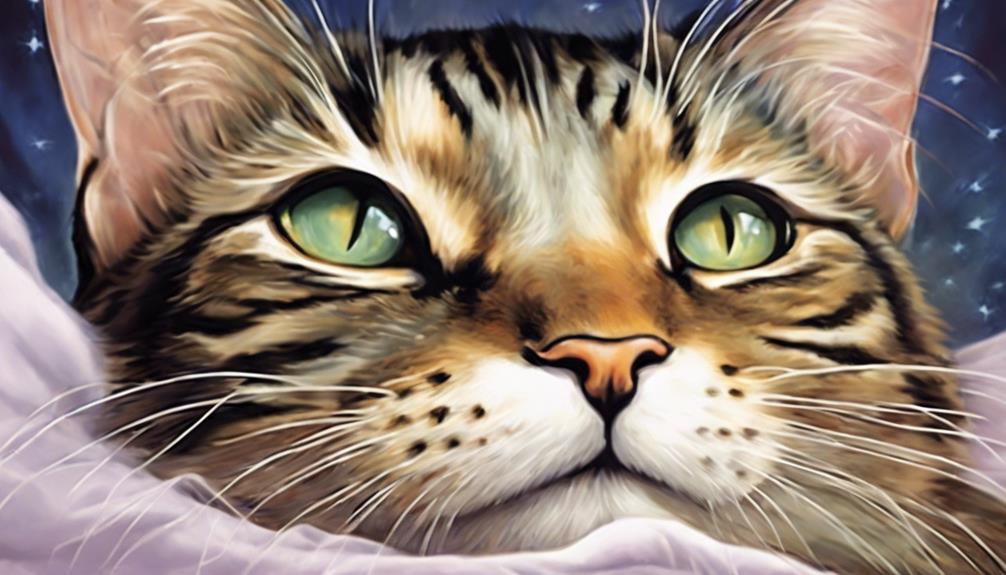
Implementing stress management strategies is essential for enhancing the well-being of cats and alleviating skin conditions such as chin mites. Cats, like us, can experience anxiety and stress, impacting their overall health. Here are some effective ways to help your feline friend relax and thrive:
- Create an Enriched Environment: Providing interactive toys, scratching posts, and safe hiding spots can offer mental stimulation and reduce stress levels.
- Engage in Regular Playtime: Spending quality time playing with your cat not only strengthens your bond but also promotes relaxation and reduces anxiety.
- Establish a Consistent Routine: Cats thrive on predictability, so maintaining a regular schedule for feeding, play, and rest can help lower their stress levels.
Monitoring Cat Chin Mites
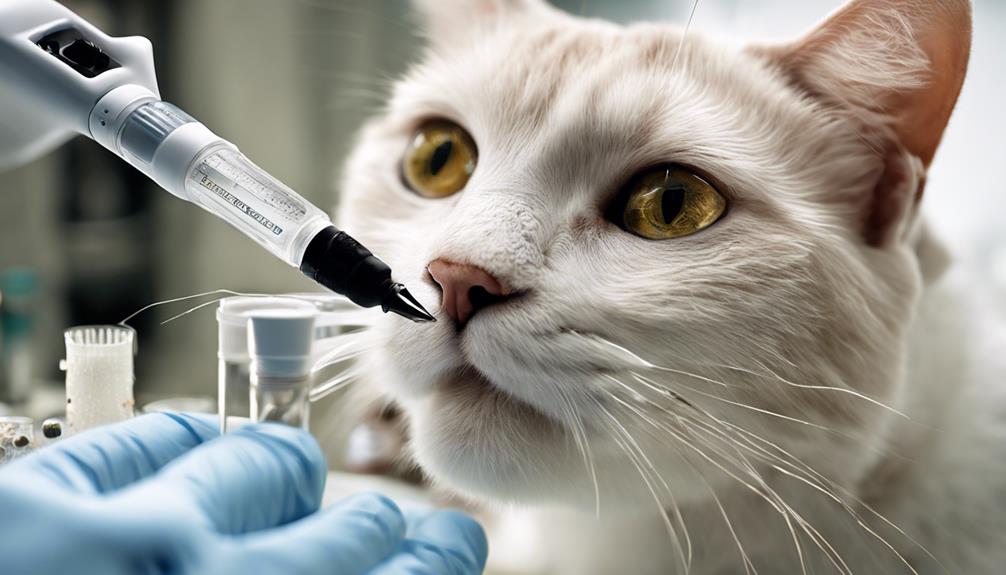
When monitoring cat chin mites, it's important to watch out for symptoms like:
- itching,
- redness,
- hair loss, and
- skin inflammation on the chin area.
Changes in behavior, such as increased scratching or discomfort around the chin, can also be telltale signs of mites.
Symptoms of Chin Mites
Symptoms of chin mites in cats manifest as:
- Redness
- Itching
- Hair loss
- Scabs
- Crusts on the chin area
Additional signs include:
- Excessive scratching or rubbing of the chin and face
These symptoms indicate a potential infestation that requires prompt attention. When monitoring your cat for chin mites, keep an eye out for:
- Red bumps or patches on the chin area
- Persistent itching and scratching
- Hair loss or thinning in the chin region
Treatment Options Available
After identifying symptoms of chin mites in cats, the next step involves exploring available treatment options for effectively managing and eradicating the mites. Monitoring cat chin mites includes regular skin examinations to check for mites, skin irritation, hair loss, and other symptoms. Treatment options for cat chin mites may include topical medications prescribed by a veterinarian to kill the mites effectively. It is important to follow the prescribed treatment regimen and monitor the cat's progress to guarantee the mites are eradicated. In severe cases, additional treatments such as anti-inflammatory drugs or antibiotics may be necessary to manage the mite infestation effectively. Regular follow-up appointments with the vet are recommended to assess the cat's response to treatment and make any necessary adjustments for best results.
| Treatment Options | Description |
|---|---|
| Topical Medications | Prescribed by a vet to eliminate mites effectively |
| Severe Cases | Additional treatments like anti-inflammatory drugs |
Long-Term Well-Being Strategies

How can we guarantee the long-term well-being of cats affected by chin mites?
When it comes to ensuring the ongoing health and happiness of our feline friends dealing with chin mites, there are some key strategies to keep in mind:
- Regular Chin Hygiene Routines: Implementing consistent chin hygiene practices is important in preventing the recurrence of cat chin mites. Regularly cleaning and monitoring your cat's chin area can help in detecting any early signs of mites and addressing them promptly.
- Address Underlying Causes: Apart from using prescribed topical medications, it's crucial to address any underlying issues that may be contributing to the mite infestation. Factors like stress or allergic reactions can exacerbate the condition, so identifying and managing these root causes is essential for the long-term well-being of your cat.
- Consult a Veterinarian for Long-Term Management: Seeking professional guidance and advice from a veterinarian is important for developing effective long-term management strategies for cat chin mites. Veterinarians can provide tailored recommendations and monitor your cat's progress to ensure their overall health and well-being.
Veterinarian-Prescribed Medications
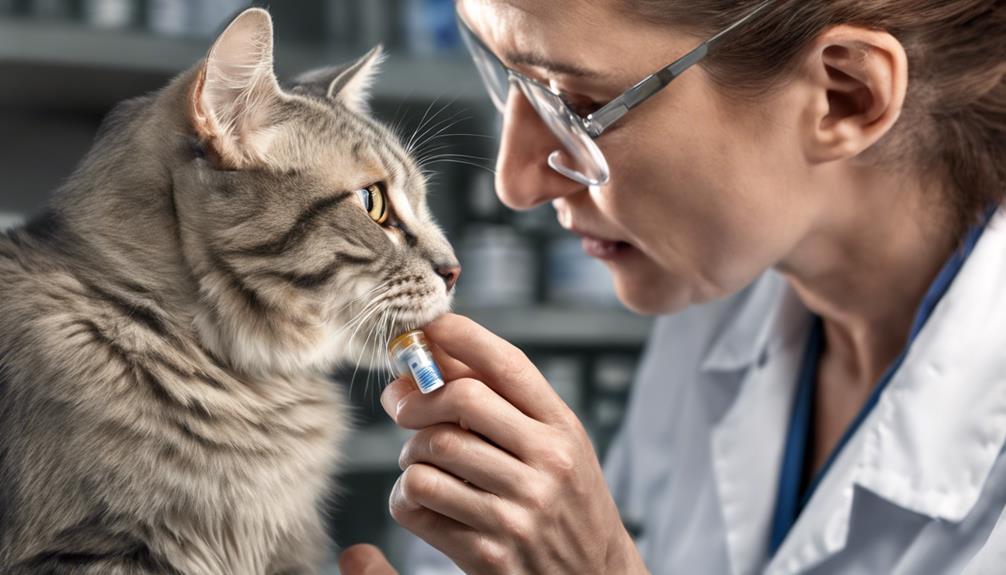
When treating cat chin mites, veterinarians may prescribe medications like selamectin or ivermectin to effectively target and eliminate the infestation.
These medications can be applied topically or administered orally, depending on the severity of the condition and the cat's health status.
It's important to follow the veterinarian's instructions regarding the type of medication, application techniques, and treatment duration to secure the best outcome for your feline friend.
Medication Types
What prescription medications are commonly used by veterinarians to treat cat chin mites?
- Topical treatments like selamectin
- Fipronil
- Imidacloprid/moxidectin
These medications target the mites residing on the skin and work towards eliminating the infestation. Veterinarian-prescribed medications play an important role in effectively treating cat chin mites and managing any associated skin issues.
Depending on the severity of the infestation, your vet may recommend a specific medication or a combination therapy for the best results. Remember, consistent application of the prescribed medication as instructed by the veterinarian is key to successfully eradicating cat chin mites. Trust your vet's guidance and follow the treatment plan diligently for the health and comfort of your feline companion.
Application Instructions
Moving from discussing prescription medications commonly used for cat chin mites, applying these treatments correctly is vital for effective eradication and management of the infestation. Follow the veterinarian's instructions meticulously to guarantee ideal results.
When applying the prescribed medication, make sure to target the affected area on your cat's chin precisely as directed. Complete coverage of the chin area is essential to effectively combat the mites.
Keep a close eye on your cat for any signs of improvement or adverse reactions to the treatment. If you notice any concerns or unexpected reactions during the treatment process, contact your veterinarian right away for guidance.
Proper application of the medication is key to successfully treating cat chin mites.
Treatment Duration
The treatment duration for veterinarian-prescribed medications for cat chin mites typically varies depending on the severity of the infestation and the cat's response to the prescribed treatment plan.
- Treatment may range from several weeks to a few months, tailored to your cat's specific needs.
- Regular follow-up appointments with the vet are essential to track progress and make any necessary adjustments.
- Some medications might require multiple administrations throughout the treatment period for best effectiveness.
Ensuring your furry companion completes the full treatment duration is vital to completely eradicate the mites and prevent any chances of a recurrence. Trusting the vet's guidance and staying committed to the treatment plan will help your cat get back to their playful self in no time!
Alleviating Skin Issues

To alleviate skin issues in cats affected by mite infestations, it's essential to administer appropriate topical medications recommended by veterinarians. When dealing with cat chin mites or other mite infestations causing skin problems, treatments like selamectin and fipronil have shown effectiveness in addressing these issues. These medications work to target the mites or their eggs directly, helping to alleviate symptoms such as itching, redness, scales, and hair loss. By following the guidance of your veterinarian and applying these topical treatments as directed, you can support your cat in finding relief from the discomfort caused by mites.
In addition to topical medications, it's important to create a soothing environment for your cat during this time. Providing a calm and stress-free space can aid in their recovery process. Remember to handle your cat gently and with care, ensuring they feel safe and secure throughout their treatment for skin issues related to mite infestations. By combining proper medication with a supportive environment, you can help your feline companion feel more comfortable as they work towards healing their skin.
Relief From Itching and Redness
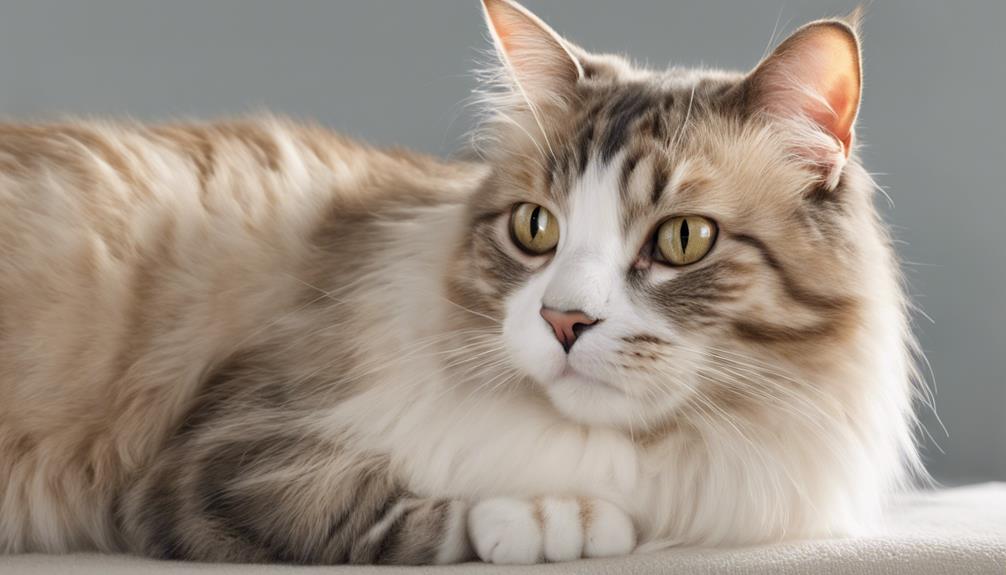
When addressing cat chin mites and their associated itching and redness, utilizing topical treatments like fipronil, selamectin, or imidacloprid/moxidectin is essential for providing relief. These medications target the mites infesting the skin, helping to alleviate discomfort and inflammation. Regular application as prescribed by a veterinarian is vital for effectively managing cat chin mites and reducing symptoms. In severe cases, additional treatments like corticosteroids may be necessary to address intense itching and skin irritation.
- Consistent Application: Applying the topical treatments regularly as directed by your vet ensures optimal effectiveness in combating cat chin mites and their symptoms.
- Follow-up Care: Regular check-ups with the veterinarian can help monitor the progress of the treatment and make any necessary adjustments to guarantee your cat's comfort.
- Gentle Care: Providing gentle care and attention to your cat's affected chin area can aid in soothing the itching and redness while the treatments take effect.
Hair Loss Prevention
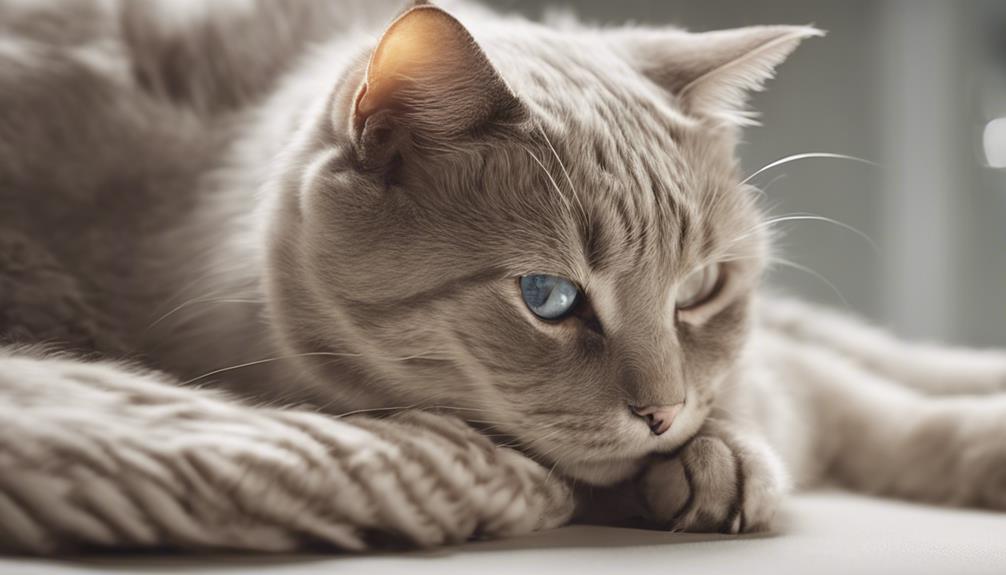
Regular grooming and cleaning of the cat's chin area can greatly aid in preventing hair loss caused by chin mites. By gently removing any debris or crust that may harbor mites, we can help maintain healthy hair follicles and prevent unnecessary shedding. Additionally, using vet-recommended topical medications can effectively target chin mites and reduce the risk of hair loss. These medications can soothe irritated skin, promote healing, and ultimately preserve your feline friend's lush coat.
It's important to note that cat acne, often mistaken for chin mites, can also contribute to hair loss if left untreated. Ensuring your cat's chin area is clean and free from excess oil buildup can help prevent acne flare-ups and subsequent hair loss. By incorporating these simple practices into your cat's grooming routine, you can proactively protect their hair from the damaging effects of chin mites and other skin conditions. Remember, a healthy diet and stress-free environment further support your cat's overall well-being and can aid in maintaining a vibrant coat free from the effects of chin mites.
Cat Chin Mites Prevention Tips
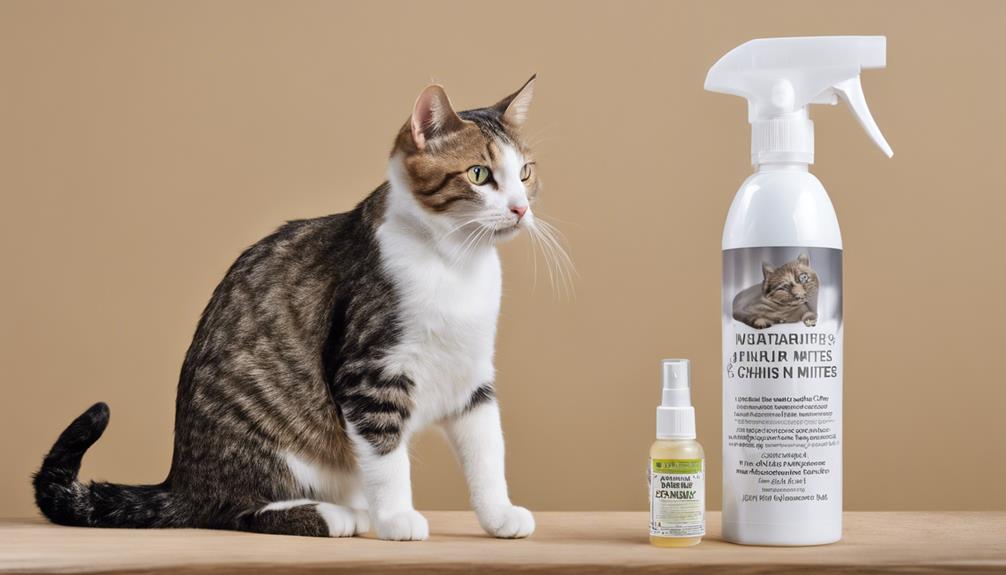
To safeguard against cat chin mites, it's crucial to groom your feline companion regularly and watch for any signs of infestation.
Routine vet check-ups can help detect any issues early on and guarantee your cat's overall health.
Grooming for Prevention
By maintaining a regular grooming routine with a cat-safe shampoo, cat owners can effectively prevent chin mites by ensuring the skin remains clean and free of debris. When grooming for prevention, consider the following tips:
- Use a fine-toothed comb or brush: Specifically designed for cats, these tools can help remove any potential mites or eggs from the chin area.
- Avoid harsh chemicals: Refrain from using products that may irritate the skin, potentially worsening mite infestations.
- Ensure a balanced diet: Supporting overall skin health and immune system can aid in preventing mite infestations.
Taking these steps can help keep your feline friend healthy and free from the discomfort of chin mites.
Regular Vet Check-Ups
When booking vet appointments, make sure to schedule timely check-ups to proactively address and prevent potential cat chin mite issues. Essential vet check-ups play an important role in monitoring and managing cat chin mites effectively.
During these visits, veterinarians can recommend preventive measures such as vaccinations and parasite control programs to reduce the risk of mite infestations in cats. Routine skin examinations conducted by vets can aid in early detection of cat chin mites before they become severe, ensuring prompt treatment and resolution.
Ensuring Feline Comfort
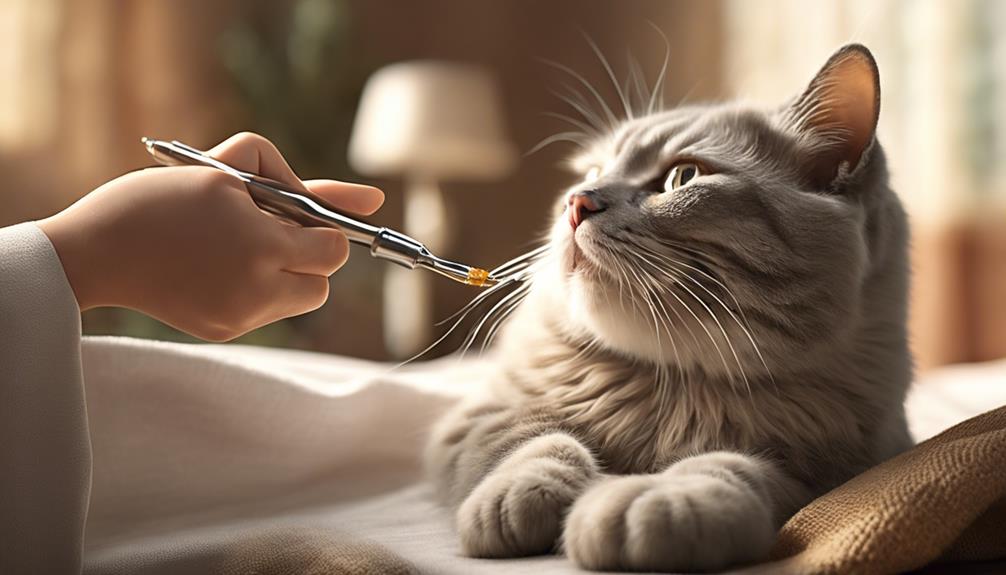
Ensuring the comfort of felines during the treatment of chin mites is essential for their well-being and recovery. When addressing feline comfort during chin mite treatment, consider the following:
- Soft Bedding: Providing a cozy and comfortable resting area can help your cat feel secure and relaxed during their treatment period.
- Gentle Handling: Approach your cat with care and gentleness to avoid causing additional stress or discomfort while administering treatments.
- Quiet Environment: Creating a calm and quiet space for your cat can help reduce anxiety and promote a sense of tranquility during their recovery process.
Frequently Asked Questions
How Do I Get Rid of Mites on My Cats Chin?
We use vet-prescribed topical medications like fipronil, selamectin, or ivermectin for cat chin mites. Regular cleaning helps prevent spread. Following vet advice on environmental treatment is vital. Monitoring for mites and seeking professional guidance are essential for effective treatment.
How Do You Treat Chin Dermatitis in Cats?
We treat chin dermatitis in cats by using topical medications like benzoyl peroxide or antibiotics to reduce inflammation. Regular cleaning with cat-safe products helps manage it. In severe cases, oral meds or corticosteroids may be needed under veterinary guidance.
Is There a Topical Treatment for Mites on Cats?
Absolutely, topical treatments like selamectin, fipronil, and imidacloprid/moxidectin are fantastic options to combat mites on cats effectively. These solutions, when applied directly to the skin, work wonders in eliminating those pesky mites and keeping our furry friends healthy and happy.
How Long Does It Take to Get Rid of Mites on Cats?
Getting rid of mites on cats can vary in duration depending on treatment and mite type. Consistent treatment adherence speeds up mite elimination. Regular vet follow-ups guarantee complete eradication. It's crucial to follow treatment plans to prevent reinfestation.
Can Chin Mites Cause My Cat’s Pupils to Stay Dilated?
Chin mites do not affect a cat’s pupils directly. If you’re concerned about dilated pupils, it’s important to consult a vet. Understanding cat pupils can help you notice abnormal changes and seek appropriate medical care for your pet.
Conclusion
To sum up, dealing with cat chin mites promptly is crucial for your feline friend's comfort and well-being.
By comprehending the symptoms, causes, and effective treatments, you can guarantee relief and prevent further issues.
Remember, keeping your cat's chin clean and monitoring for any signs of mites can secure a happy and healthy pet.
Stay informed, take action, and enjoy many chin scratch-free moments with your beloved furry companion.
Paul’s love for animals knows no bounds. As a dedicated writer and animal lover, Paul brings a unique perspective to our team. His firsthand experiences with various animals enrich our content and provide valuable insights into their behavior and needs. Whether he’s sharing tips for pet care or shedding light on pressing conservation issues, Paul’s passion for animals shines through in everything he does.
-

 Vetted2 months ago
Vetted2 months ago15 Best Dog Food Brands Recommended by Vets for Healthy and Happy Pups
-

 Vetted2 months ago
Vetted2 months ago14 Best Homemade Dog Food Recipes Your Pup Will Love – Vet Approved & Nutritious
-

 Vetted2 months ago
Vetted2 months ago15 Best Cat Foods for Managing Hyperthyroidism – Vet Approved and Feline Friendly
-

 Vetted2 months ago
Vetted2 months ago15 Best Affordable Dog Foods That Won't Break the Bank
-
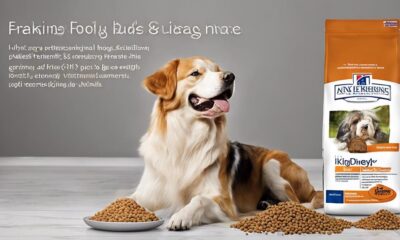
 Vetted2 months ago
Vetted2 months ago15 Best Dog Foods for Kidney Disease – Expert Recommendations for Your Pet's Health
-

 Vetted2 months ago
Vetted2 months ago15 Best Affordable Cat Foods That Won't Break the Bank
-

 Deers3 months ago
Deers3 months agoCaring for Baby Deer: Tips for Healthy Fawns
-

 Cats1 month ago
Cats1 month agoCat Weight Chart by Age: Kitten to Senior in Lbs


















